#the way morality operates on this show is so fascinating! it needs its own post
Explore tagged Tumblr posts
Text
supernatural was truly just. a fifteen year long experimental study looking into an audience's ability to empathise with the Narrative Scapegoat. the results? most people are still filled with the medieval urge to throw rotten fruit at the resident Freak in the town square.
#reflecting on the nature of most sam hate i encounter and it's exactly just that#mixed combo of poor media literacy but also just the nature of genre storytelling#no one's gonna notice the subversions you're trying to pull! people will read it all at a Literal surface level#even when this show gets incredibly on the nose w it's metatextual signposting#the way morality operates on this show is so fascinating! it needs its own post#sam tries escaping his family and the story he's trapped in#but that decision gets burdened w the moral weight of#well look! you're neglecting your responsibility to save innocent people from monsters#and now you've put innocent bystanders in the path of danger! your girlfriend's dead!#sam monstrosity studies#j.txt
636 notes
·
View notes
Note
What does it mean when you have venus trine pluto in a natal chart? And having pluto and north node in 8th house?
Hello, Do you have early degree Leo Venus and late degree Scorpio Pluto?
For Pluto in 8H, you can read about it my other post here.
I will talk about North node in 8H in this post.
*Note: it would be easier for me to reply and organise posts if you ask one placement in each ask rather than many in one.

North node in 8th house/ in Scorpio
Personally, I feel North node is a point where we are obsessing over, an aspiration that we are looking towards, but also a fear that we are avoiding. It feels fascinating and holds a great pull over us because deep down, we know we need this energy to expand and grow, but we can feel out of depth and uncomfortable because it's so different from our mode of operation. There's something out of reach about the North node, sometimes we feel like we have finally understood and mastered the traits of the North node, but look closely, we are still acting from our South node. So in a way, we strive to be the North node, by acting with our South node, it's a seesaw energy, we don't completely abandon the South node and embrace the North node, rather, we try to fuse them together. Like the ouroboros, a serpent/dragon eating its own tail.
So North node in 8H and in Scorpio shows you that it's the theme of the 8H and Scorpio that fascinates you deeply, you want to embrace that theme, yet can feel not fully equipped to do it.
Have the desire to go deep into things and people. Want to see the core of everything. Fear/hate being considered superficial.
At the same time, fear falling too deep into everything, because once you go in, you can't go out. It can manifest as surface level of commitment. To fully, truly commit to something/someone is a challenge but also a goal.
Physical pleasure feels hollow without an emotional and spiritual meaning.
Fear of death. Survivor mentality. Want to feel powerful and well prepared for crises. Always on the look out for dangers.
Strong aversion to violence of any kinds.
Loose attachment with material possessions. Tend to be non-materialistic.
Enjoy an ascetic lifestyle.
Fascination with the theme of death and rebirth, of life and growth.
Want to understand the underlying psychology of people rather than just surface interactions.
Suspicious of others' motives.
Like to work behind the scene, in secret, researching, uncovering secrets.
Good at keeping other people's possessions safe, especially secrets and money. People can trust you easily with their possessions.
Tempted by the idea of vengeance, this is the challenge to test your own moral code and principles.
Can be stubborn and too set in one's own convictions.
Want to have a deep connection, a fusion of two people, but at the same time, struggle in sharing yourself with the other person.
Being used to independence, the idea of sharing and asking for help, whether mentally, emotionally, physically or in any other aspects, can be a great horror and fear for you.
Can have psychic ability but sceptical about it, or approach spirituality and metaphysical topics with pragmatism.
Can live a long life. Have great regenerative ability.

#north node#north node in 8th#north node in scorpio#pluto in 8th#pluto#8th house#astro observations#astrology aspects#astrology placements#astro notes#astro community#astroblr#ask me questions#astrology asks
46 notes
·
View notes
Text
Hypocrisy (Launch)
In my opinion, there are two broad sides of literary analysis. “I think this is a bout… because…” and “I like/dislike this because…”
I am also of the opinion that it is not fun to discuss things I am not fond of. Partially, this is because there is a difference between something not working and something not working for me. As in, am I not the target audience, or does this miss the mark it was aiming for?
However, I genuinely dislike Launch. I think it has some redeeming qualities, and I am going to make the case for them in this post. But I think this episode falls short, or rather, is held back by one detail that I think is important.
Let me explain.
SPOILERS AHEAD: (She-Ra and the Princesses of Power, The Owl House)

I’m going to start with the positive. I really like how Horde Prime is portrayed in this episode.
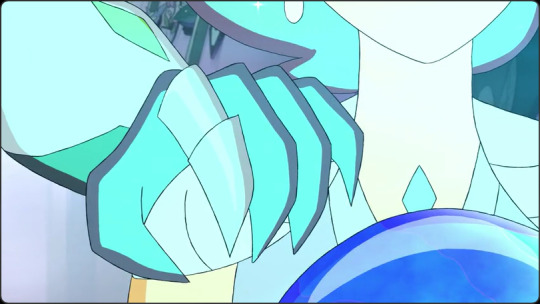
This is technically his third appearance, although it’s his second majour episode, and as such, we are still learning about him. So far, we have seen his cruelty and tactics. This man operates through restriction of free will, forcing others into actions he wishes of them. He is a con artist, a cult leader, an abuser.
Here, we see his hypocrisy. In my last post, I talked about how his antagonism reflects the themes, and I think that continues into this character trait of his.
The main question of this season is “what do you want?” Where do you want to go? What are you going to do? The characters are exercising their free will for the first time and struggling, falling on bad habits or doing nothing instead. The escape from abuse is framed as more than just physical, but psychological.
This is a season centred around motive.
As such, Horde Prime is a character who lies about his motivations at every turn.
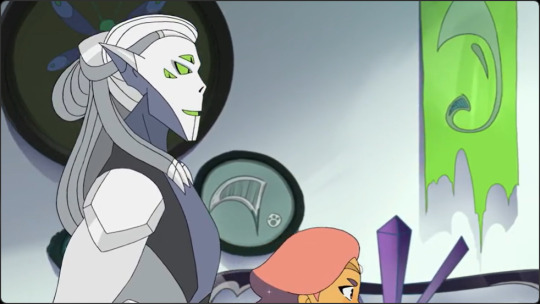
In my series on The Owl House, I discuss Belos as an obsessive, too held by his own ideas and self-importance to see his error. I think Horde Prime is similar, but with one main difference. Both have egos the size of a solar system, and both have a worldview based on self supremacy. But I don’t think Horde Prime has a motivation.
Bellos had a 42 step plan of genocide and heroism because he wanted to be the next Witch Hunter General. Horde Prime seems to want conquest only because it is fun at the time. He is a shallow person.
This stems from the difference in story. The Owl House is about Luz learning she is not the main character and so a villain who shares that flaw but can’t progress beyond it is a good way of getting that across thematically. She-Ra is about shaking off the psychological chains left by abuse. It is a more introspective and psychological story, so the villain doesn’t need to be complex. This story isn’t about him, its about the struggle to defeat something he happens to symbolize.
So, let’s take a look at some of the statements he makes during this episode.
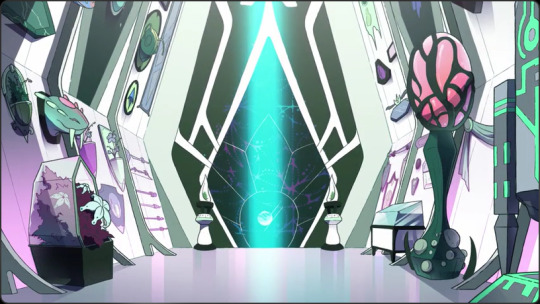
“Worlds that I brought into my eternal light.”
This one gets called out as bollocks pretty immediately by Glimmer.
Light is a fascinating way of describing death, and the idea that it can somehow be his is an insult to the many hard working Grim Reapers across the world. Horde Prime is reveling in power, showing off how well he kills people, as if destroying something is the same as owning it.
In his mind, it would seem, the two concepts are interchangeable, destruction and control. We can link this back to the idea of abuse and suggest that Horde Prime is abusive because that’s how he expresses ownership.
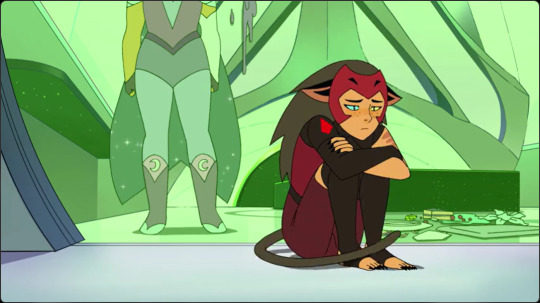
Catra had a similar mantra earlier on in the series. She wanted to be safe, and she associated control with safety and physical abuse with control.
The issue with this is that possessing something and destroying it are opposites. Not even on a moral sense, in practicality. If you have a thing and destroy that thing, you no longer have that thing. It’s gone.
Horde Prime has collected “trinkets” from places he has destroyed, so that he can have them when nobody else can. But again, there is an issue.
Artifacts are worth things to people. If the culture or the original owner give them value. If all traces of that person or culture are destroyed, historians will value the item.
But if the vast history is reduced to a “behold, my shiny thing” on your wall with nobody to see but yourself, then it loses that power.
It’s demeaning.

This is part of a recurring thing with Glimmer's response to Horde Prime. She did it with the Black Garnet in the season four finale. Glimmer lashes out at Horde Prime in an attempt to gain back her freedom, but he has put up so many shields that she can only destroy things that he has put between them. Often, those things did nothing to deserve it except be in the way. It's the cycle of abuse in action.
We see this in the real world with museums (one in particular but it is far from the only offender) keeping items it describes as loot in its accounting hidden away from their original owners. Those owners have their connection to their original culture deliberately weakened as a method of control. Or they find it insulting specifically because the items and the culture by extension are not given the respect and value they deserve. It is a psychological mode of colonialism.
Horde Prime has done this, but to himself as well as everyone else. He has taken the items from their home, denigrating their possible importance and making it to that they only signify his victory, his triumph, his possession. But he has so many that they lose that significance even to him.
Case and point, we don’t ever learn any of the names of places Horde Prime has destroyed. He doesn’t care about them, just taking their stuff. We don’t know the history of anything in this room, Horde Prime has forcibly taken that from them.
Eternal light? Bollocks.

“I take no joy in destruction. But the weeds must be burned away so that new life must flourish.”
Ok smart guy. If that’s true, why are you so cruel? If you take no joy in this, why do you do it?
Draw your mind back to when Horde Prime summoned Glimmer to meet with him. His takeover of this clone seems rather painful.
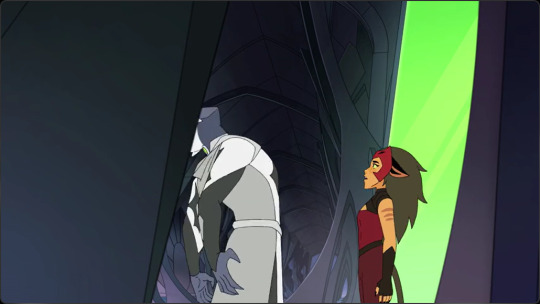
If he took no joy in destruction, why would this exist? Why would he have ostensibly invented a way of control that was this painful? Clearly he only wants to target the mind, why does he have to twist the subject to get to that?
The answer is as I mentioned earlier. He can’t separate control from destruction.

But, to take apart the metaphor, ecosystems are balanced for the most part. You don’t have to burn away the weeds in a forest for it to be beautiful. There’s nobody going around in outback Australia with a set of gardening gloves.
Invasive species are a problem, sure. But again, that’s Horde Prime. He is the outlier, the issue, the intruder. He is the colonist.
Additionally, most plants are flammable, and fire is notoriously difficult to control. If you burn away the weeds, you will burn away everything.
I live in Australia. The cycle of life here is based in a large way on fire. Certain plants have seeds that only grow after a fire, but that’s devastating to everything else, including the plants that have already sprouted. The term “trial by fire” isn’t a positive one.
Also, fun fact, we have a word in Australia for people like Horde Prime. People who take from others for the sake of it. It starts with a c.
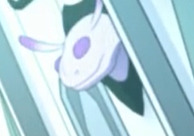
I find that people with heads on their walls tend to at least enjoy the act of obtaining them.
However, weeds aren’t necessarily invasive species. In reality, and in the way Prime meant it, weeds are wild plants that interrupt the growing of a garden. In other words, they aren’t bad, they just happen to be where you want them to be.
If you apply this to people and places, this is how things like planetary genocide happen, and it leads back to a point I have been making for five seasons. The abuse isn’t about the victim, it’s about the abuser.
Horde Prime doesn’t care about the planets he destroys, they may have angered him, but we don’t know that. All that matters is his high of control, his glory and treasure, and the fact they were there.

Hot.
“Your planet belongs to me.”
No, it doesn’t. If it did, Prime wouldn’t need Glimmer’s help.

Just a picture of the planet not belonging to Prime. Nothing to see here beside the villain being wrong.
“I am still merciful”
Prime is in a room filled with icons of planets you destroyed. How many of them surrendered? How many of them asked for his mercy?
“Those who cling to the darkness have made their choice.”
Ok. Let’s talk about light and dark symbolism.
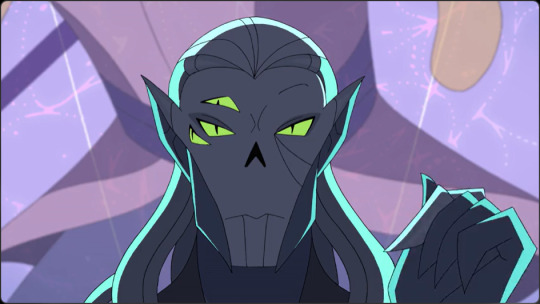
Worth pointing out that the first thing Prime does after complaining about people choosing darkness is snap his fingers, and turn off the light. Glimmer can't do that, she can only create things shat glow, Horde prime can cut things off.
Light and dark are usually synonymous with good and bad. This leads to issues of coding and problems of stereotypes that I am not entirely equipped to discuss. But broadly, this is the norm.
Horde Prime subverts this. He is identified with light and clearly the villain of the story. But he is simple in his application.
Light is only special in comparison to shadow. It reveals things and shines the brightest when there is none else around. When everything is lit up, the world seems flat.

We see this in the animation of She-Ra itself. I highlight moments that look stunning, but those that don’t usually fall short in my opinion because everything within has that same lighting. Everything feels monotonous.
Horde Prime is all light. There is no choice for anyone. You will be revealed, you cannot hide. Every wall in his ship is white or light grey, every surface bathed in that light.
Too much light is blinding.
The man forces everything to be without nuance, which is especially noticeable in a show that excels so much on writing humanity.
Or rather, it would be noticeable, if it were in any other episode.
Buckle up, I have thoughts.
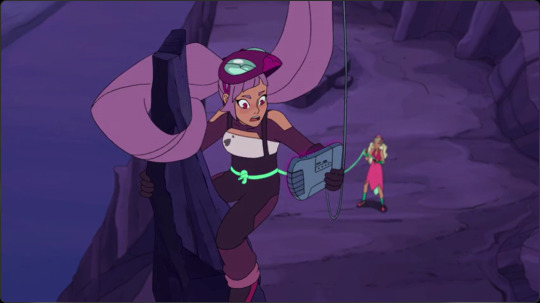
I want to preface this with something important. It is possible to dislike part of something and still like that thing overall. Not all criticism should or can be crippling.
I love She-Ra and the Princesses of Power, it is one of my favorite stories out there, and I would not have devoted this much time to discussing it if I didn’t enjoy the series or find it worthwhile.
However, I dislike this episode more than can simply be left in the Final Thoughts section. I think that it’s handling of Entrapta doesn’t work.
Entrapta is a nuanced character in this series, just like everyone else (even Frosta). She breaks the moral spectrum of the series by refusing to care about it, and rather than that leaving her as neutral, it means she is villainous in some situations and heroic in others without breaking character. She has a moral compass, it’s just different to everyone else’s.
She is also neurodivergent, and this episode tries to talk about motivation and those who hide that by leaning into the neurodivergent stereotype and pulling her really far out of character.

First, impulsiveness and lack of regard for orders and plans. We focus on how much it upsets the others, but wait a step. This is She-Ra. Everyone breaks orders, everyone does their own thing all the time. Why is it so annoying when Entrapta does it but not anyone else?
Second, the alignment issue. The complaint from the others that she built weapons to hurt them and their kingdoms. This is a good point, only slightly undercut by the fact that Scorpia is standing less than a metre from all of these people. Does she not count? Again, why is it so frustrating when Entrapta does it but not anyone else?
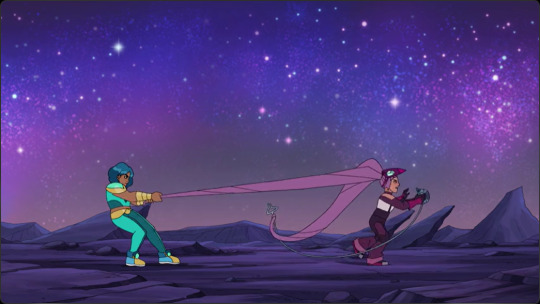
Third, the emotional disconnect. Entrapta is bad at listening and reading emotions. She is also obsessive, and doesn’t seem to care about anyone other than herself and her tech until she tells you.
On the one hand, speaking as someone who is neurodivergent, obsession is something I struggle with, and reading emotional cues is difficult.
But we have seen Entrapta misread emotions before. We have seen her responses to Catra and Scorpia before. She isn’t good with the emotional stuff, so she learns context clues. If the characters around her react in the same way to different stimuli, Entrapta will register and assume there is a similar emotion there, even when the minute details reveal otherwise. She’s not incapable, she just goes about it a different way.
She also shows her affection in a manner unique to her. It’s not that she doesn’t care, its that she expresses that care dissimilarly. For example, she gives a lot of compliments and gifts, and it takes Catra and Scorpia a while to warm up to this because that kind of thing can get unnerving if you aren’t expecting it and in a way that can be hard to grapple if you are neurodiverse.
Put a pin in that phrasing. “It can be hard.”
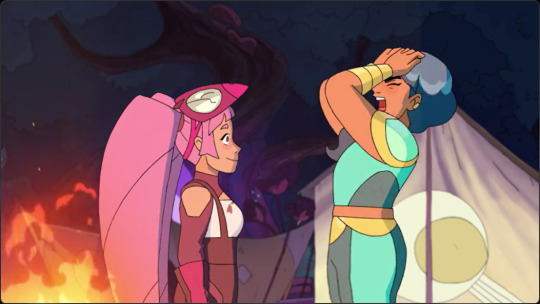
There is a difference between that and being unwilling to help Glimmer unless she can go to space. That kind of bargaining obsession isn’t a trait we have seen in Entrapta at all. She is clever and knows how to get what she wants, yes, but she very clearly does care.
Later on in the episode, we actually see this in action. During and after the confrontation, Entrapta hyper fixates on the signal in a way that is more than just the obsession with tech. She demonstrates her dimensionality by using what she knows she is good at to help her friend, and she does it in a way that fits her character. She finds a tangible thing that can help and she damn well gets that thing.
I actually like the moment where she audibly tells herself to focus. It's a character beat played for humour that doesn't demean her at all. It's a real thing that I and a few other neurodivergent people that I know do, and it is objectively quite funny.

Can you see the difference between that and “I love space”, “I would give anything to go to space” and *waits blankly because the only thing that can motivate her to do anything is the thought of going to space.*
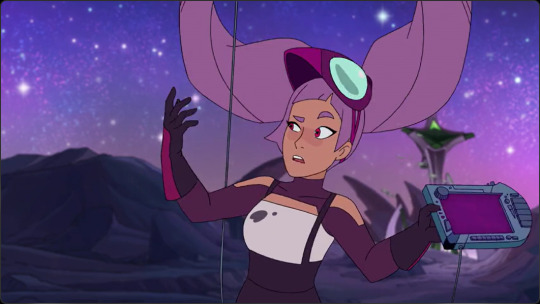
Hey look, it's the trope of "neurodivergent person talks so much jargon that nobody can understand them". Hooray. I find this trope annoying because usually the writer doesn't know that much technical Jargon, so they make the character either make up words, or say something normal and have everyone else look like an eejit. This scene does the second, Entrapta isn't saying anything other characters in this scene have already said. But also, they know her and have spent a not insignificant amount of time with her, they should be able to understand her.
The key thing here is the phrasing from earlier. “It can be hard.” Can is the operative word.
There are neurodiverse people who match the stereotype. But there are also a vast number of people who don’t.
The word is neurodiverse, it’s an out group not an in group. It isn’t a collection of people who fit a specific box that is separate from the majority of people who fit a different box. It is a plethora of different ways of operating. Diversity, not conformity.
Entrapta was that and is that for the majority of the series. She wasn’t the stereotype, she was just a person who worked differently from others. But here, she acts out of character so that a flaw she didn’t have could be used as a plot device.

This is especially frustrating because the main two who criticize Entrapta's behaviour in this way are Mermista and Perfuma, who, as I have discussed, are ALSO NEURODIVERGENT!
Perfuma shows signs of Obsessive Compulsive Disorder, and it is part of her greatest strength and greatest weakness. In other words, a pretty core part of her character. Perfuma doesn’t yield on things, she is remarkably stubborn but freaks out when people get too loud or too emotional around her in a way that I liken to an overstimulation response. She struggles with that out of the box thinking.
Mermista, on the other hand, had a whole episode about how she was tricked into giving time for a rebellion because an opportunity arose to cosplay one of her favorite book series and she couldn’t let it go. Mermista who learned to time lightning in a storm because she practiced at home.

And the pièce de résistance?
“You’re still a weirdo, but you did good today.”
Excuse me?
The compliment is a caveat to an insult, which undermines Mermista’s argument a little bit. Still odd, but welcome because she is useful?
This was not an issue Mermista had. She was already the person who would do anything for people. She was willing to work with Shadow Weaver and Entrapta and Scorpia because they were already useful and/or were part of the fold. She didn’t need this character arc.
In short, I think multiple characters act out of character and it results in the neurodivergent individual seeming like a caricature and the plot feeling contrived.

I don't have much on this scene that relates to my whole point, but don't think I missed it.
Final Thoughts
I once again feel the need to stress that I still love the series as a whole, but also that I don’t make a habit of explaining why I think things are bad. This episode needed this discussion, and needs to be treated as an outlier.
And again, it is an outlier. The characters don’t act like themselves. Entraptra is written better in the rest of the series. This episode feels out of place in a good show, which is why it stands out so much.
Next week, however, we get back to the positive, with Corridors. Stick around if that interests you.
Previous - Next
#rants#literary analysis#literature analysis#what's so special about...?#character analysis#she ra and the princesses of power#she ra#spop#spop entrapta#spop horde prime#i don't like being negative about stories#this is not an anti post#king micah is hot#this is going against my thesis that Mermista can do no wrong but since it is a one off i have decided to ignore it
17 notes
·
View notes
Text
I am so very sick and tired of the toxicity that’s been poisoning the snk fandom as of the last couple years. I gave myself time to digest the ending and my feelings on it, before embarking in a journey to debunk many misconceptions and critiques I’ve seen floating in the fandom.
By the way, by no means I think this ending is perfect. I think this is textbook execution by Isayama to tie together every loose end left behind in an orderly manner, and I think that it was a bit rushed and oversimplified. I would’ve wanted more of Eren and Armin’s conversation, more of the squad realizing what his true goal had been, and some narrative choices I don’t 100% agree with. But still, what I saw in other fans’ critiques post 139 frankly appalled me, so I feel the need to make this. Also, this obviously are my own interpretations, I am not Isayama himself lol
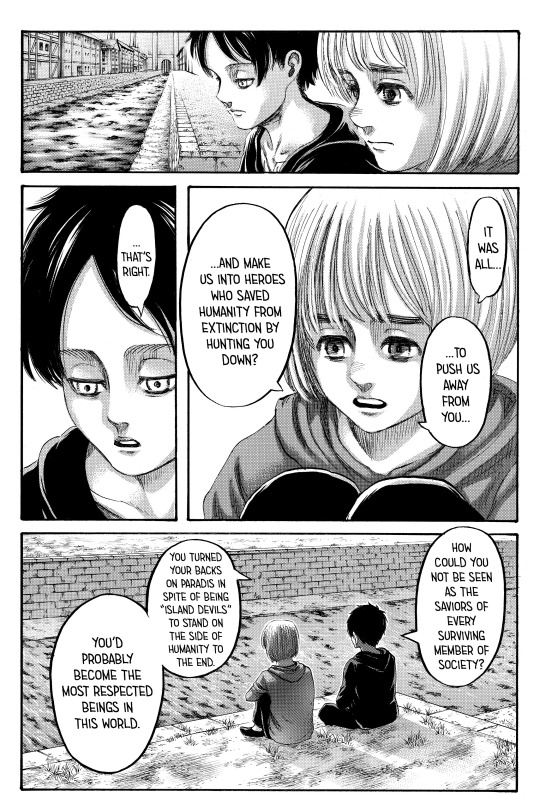
“Ew, so Eren did pull a Lelouch after all”
No, Eren did not pull a Lelouch. While his action and the final result may seem similar, I find very different nuances between the two. Lelouch wanted for the whole world to be united in fighting against him, and thus he made himself the world’s greatest enemy. His will to turn himself into a monster was selfless. Eren didn’t give a damn about the world, he had no noble intentions whatsoever. He said it in chapter 122, his goal was to protect Paradis and, more specifically, his closest friends. He turned himself into a monster, killed 80% of human population, and endangered the lives of those very friends he wanted to protect, so that by stopping him, those friends could be safe. Eren had no intentions to break out of the cycle of hatred or unite the world against himself, he just wanted to give his friends a chance to survive, and that is not selfless, it’s selfish. Eren’s goal was incredibly selfish, and biased, and driven by his feelings instead of rationality. Nothing like Lelouch!
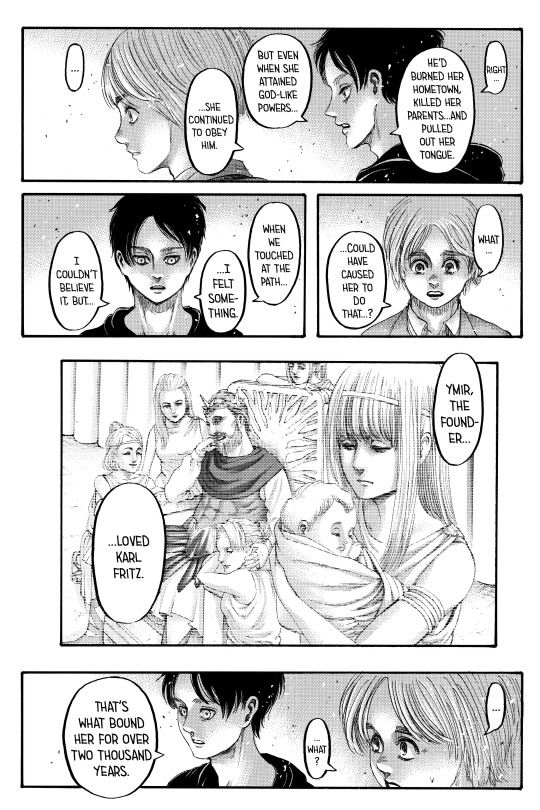
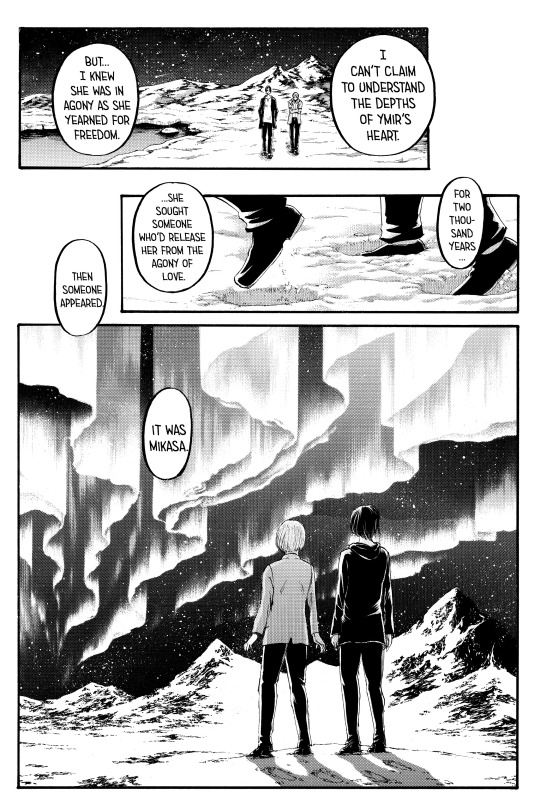
Now this, this I myself am not the greatest fan of. I feel like it makes that great scene in chapter 122 loose a bit of its strength, Ymir obeying the king for 2000 years just because she loved him. Honestly, I always thought there was a bit of Stockholm Syndrome going on, but I didn’t think it would be the only reason. However, like it or not, it’s undeniable that it makes perfect sense in the narrative that aot has always strived to tell. Love has been a theme strongly woven in the story, and it also draws a great parallel between Karl Fritz/Ymir and Eren/Mikasa. Ymir was a slave to her love for King Fritz, just like Mikasa was a slave to her love for Eren, in that she struggled to accept reality until the very end despite the atrocities that Eren committed. Ymir stayed bound by her love for King Fritz, until she saw Mikasa break from her own poisoned love, aknwoledge it, and kill Eren despite of it, or maybe because of it. Only Ymir knows that one, heh. But the point is, Mikasa showed Ymir that she could break free of a toxic love, she was that someone that Ymir had been waiting for to finally free her of her burden.
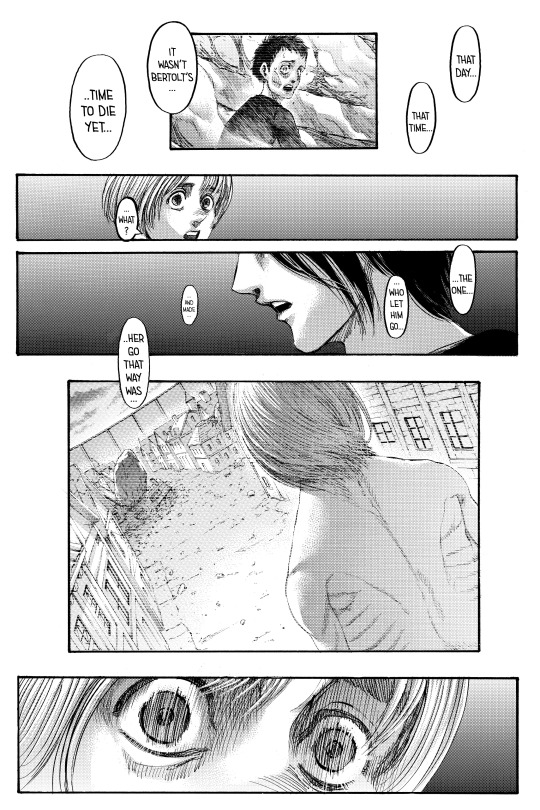
“What? But that makes no sense!”
Now, on my first read, I simply thought that Eren had ordered Dina to avoid eating Berthold, and that he had made her walk down that road unaware that his mother was trapped (because we know that the Attack Titan’s future memories aren’t infallible, there are still gaps), killing her indirectly. I’ve since then read some theories stating that Eren willingly killed his own mum in orther to give kid himself a reason to feel enough hatred to kickstart the whole story. Honestly, I like this version maybe more! But let me explain to you why this is not a plothole, like many people think. In this same chapter, we have Eren explaining how the Founder’s power works in synergy with the Attack’s: “There’s no past or future, they all exist at once”. This means that time travel in aot doesn’t work in a manner where Eren extracts himself from time and space, and from a separate realm he operates on the past. The way I understood it, the mechanics works kind of like Tokyo Revengers’ time travel. MInd you, I only watched episode one, so my understanding might be jackshit.
Spoilers for Tokyo Revengers’ episode one. In the show, the main character loses consciousness and finds himself reliving his past. He interacts with someone in this “new” past, and when he wakes up again in the present, past events had been over-written by the changes he made. I think this is how aot timetravel works, with the exception that, since past and future (and present, of course) all happen at once, side by side, there is no old past to be rewritten, neither a future to return to, and present Eren wouldn’t be aware of the changes that his future self would make. It creates sort of a time paradox, yes, in the sense that there’s a loop where present Eren’s mom has been eaten because future Eren, in the future, operated on the past by causing past Eren’s mom to be eaten, but all these Erens are one and the same, as all timelines exist at once.
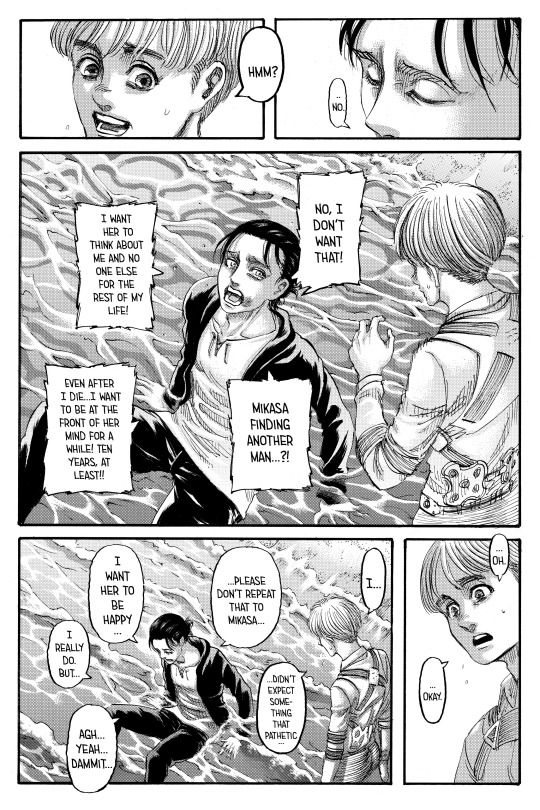
“Boo-hoo they ruined Eren’s character, he’s such a wimp!”
I have to confess (isn’t this appalling, that this is a thing that I have to confess, what the actual fuck), I am an Eren stan. I absolutely do not consider myself a Jaegerist, I think Eren’s option was better than Zeke’s, yes, but it was morally wrong and awful and he absolutely was not only in the wrong, but also if he wasn’t dead I’d want him to be punished for his crimes. I didn’t particularly enjoy him pre-timeskip, and I started to like him because I found his evolution fascinating. I wanted to understand his motives, what was going on in his head, he was a puzzle that I wanted to solve. Maybe because I’m a psychologist, who knows. Anyways, if you’re an Eren stan only because he acted like a chad and now you cry his character was ruined, I’m sorry to say, you never understood him. Eren was not a god, he was not a strategist playing 5d chess with perfect rationality, Eren was the same he has always been. He was a young man spun along by his passions. Eren feels things with burning intensity, he lets himself be driven by his emotions. He almost flattened the world because he was disappointed that he and his friends weren’t the only human beings inhabiting it, for fuck’s sake, he’s always been irrational, selfish, and immature. Of course he doesn’t wanna die, of course he want’s to live with all of them. You really expected a 15 year old hot-headed brat to become Thanos after he suddenly found out he killed his own mum and all his dreams had been crushed? Of course he felt conflicted, of course he suffered, of course he wanted to live, “because he was born in this world”. Honestly, when I read his meltdown, I felt relieved that his character hadn’t been turned on its head, it was heartbreaking to see that he really was the same brat he’d always been, that he’d tried to steel himself to do horrible shit for his friends’ sake and that he felt bad about it! It made me appreciate his character a lot more, I felt nostalgic towards the times when I was irritated by his screaming and pouting. Suffice to say, this is also my answer to all those people that believe his internal monologue to convince himself the Rumbling was what he really wanted were bullshit since he “pulled a Lelouch”. How can it be bullshit? Maybe he planned to be stopped, but he also said that he thought he would’ve still done it if they hadn’t. He also said that killing a majority of the population was something that he wanted to do, not a byproduct of the alliance not stopping him early enough, because with the world’s militaries in shambles Paradis would’ve had time to prepare accordingly. Anyways, of course he needed to convince himself to do this awful thing even if he knew he wasn’t gonna succeed completely, can you imagine how horrible it would be to know your only chance is to kill thousands?
I also maybe think it was because of the spine centipede thingy? When Eren says “I don’t know why I did it, I wanted to, I had to”, he gets this faraway look on his face and we get a zoom in on one of his eyes, which is drawn very interestingly and kinda looks like the Reiss’ eyes when they were bound by the War Renounce Pact? So maybe it was also the centipede’s drive to survive and multiplicate that forced Eren to do the Rumbling so that its life wouldn’t be endangered. I don’t know how much I like this, I feel like it takes some agency away from Eren and also makes it feel like he’s not as responsible for the genocide he committed that we initially though, which mhhh maybe not, let’s have him take full responsibility for this. As I said, I’m not defending Isayama blindly, I do have some issues myself with what went down.
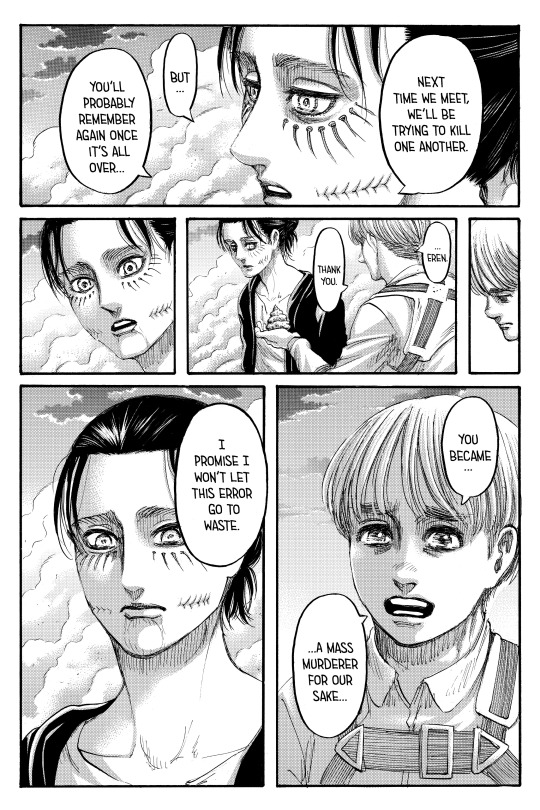
“What the fuck, did he say thank you for the genocide?”
Guys c’mon, this is like,, reading comprehension. Yes, it was poorly worded and a bit rushed, but by now you should have full context to make an educated guess on the fact that no, he didn’t thank him for committing a genocide what the fuck you guys. Armin started bringing up the idea that maybe they should have Eren eaten because he was doing morally questionable things ever since the Marley Arc, which for manga readers was like what, 2018? Isayama has been showing for three years how not okay Armin was with Eren’s actions, how could it make sense for him to thank him for a genocide? You see some poorly worded stuff, and your first instinct is to ignore eleven years’ worth of consistent characterization to jump to the worst interpretation possible? Let’s go over this sentences and reconstruct what they mean.
“Eren, thank you. You became a mass murdere for our sake. I won’t let this error go to waste”. Armin recognizes that Eren had no other choice, but does not condone it. He clearly calls it an error, which feels like an euphemism but for all we know the japanese original term used could’ve been harsher. Point is, he clearly states he think what Eren did was wrong. But he recognizes that Eren’s awful doing opened up a path for Paradis to break out of the cycle of hatred. Not a certainty, but an opportunity. He thanks Eren for giving them this chance, and promises not to waste it, even if it was born out of an atrocity. He thanks Eren for sacrificing himself for their sake, even if he doesn’t agree with the fruit of his labor, so to speak. He’s thanking Eren for the opportunity that his actions gave them, not for the actions themselves! Where the hell do you read “thank you for the genocide” guys, sheesh. I’m mad at y’all.
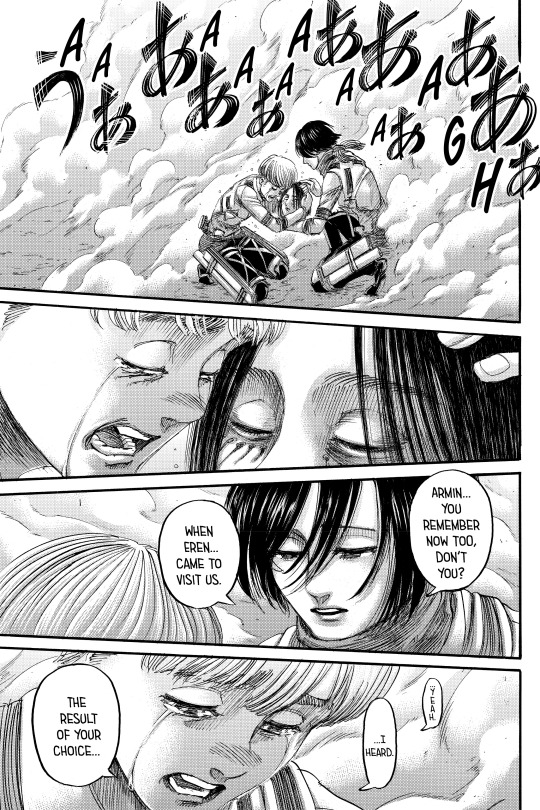
“How could Eren send MIkasa memories if she’s an Ackerman and an Asian, and their memories can’t be manipulated by the Founder? I call plothole!”
Now, here we’re going into speculation territory, so you’ve been warned. I don’t think that that information they gave us was true, about Ackermans being immune to memory manipulation. We know at least that the clan is in some way subject to the Founder’s power, or Mikasa and Levi wouldn’t have been called in the Paths by Eren multiple times. Stories never being entirely true or false, or relativity, better said, has been a strong theme in the story, we know this by Marley’s and Eldia’s different accounts of history compared to the actual Ymir backstory we got. So who’s to say that the belief that Ackermans aren’t manipulable is the truth? Maybe they’re just hard to control, not impossible. We know that by the Founder’s ability Eren experienced past and future happening simultaneously, so he could’ve very well been trying to send those memories into Mikasa’s head ever since the beginning of the story, only just succeeding in chapter 138. It would at least explain Ackerman’s headaches as Eren trying to manipulate their memories and failing. Of course, we’d need Levi side of thing to know for certain, as he had headaches too and we weren’t shown in the chapter if Eren spoke to him in paths like he did with the rest of the squad. We know he didn’t talk to Pieck, but he even went and spoke to Annie who he basically hadn’t seen since Stohess, so I hope he spoke to Levi too. Who knows, maybe he even spoke with Hanji, but she died before she could remember. I wish we were shown that, honestly, I’m sad that it was skipped, especially after Levi said in an earlier chapter that “there was so much he wanted to tell Eren”. Fingers crossed for the anime to expand on it.
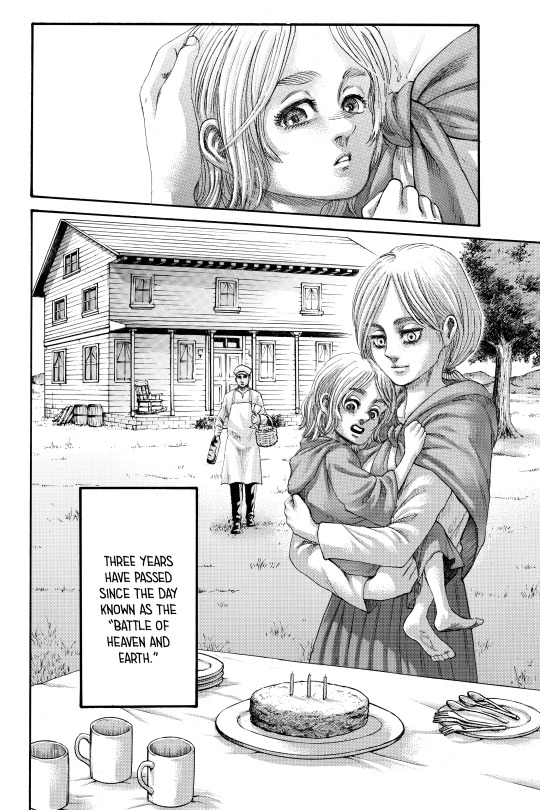
“So Historia’s pregnancy was useless”
What? No, it wasn’t useless! Eren told her to get pregnant to save her life, so that she wouldn’t be turned into the Beast Titan. If she became the Beast Titan, then Eren would’ve had to enact the plan with her instead of Zeke, and yeah, Ymir brought the power of the titans with her, so theoretically Titan Shifter Historia would’ve had her time limit removed, but we saw that the only way for the Alliance to stop the Rumbling was killing Zeke, so Historia would’ve had to die. Useless to say, when Eren talked to her about his plan, she was very vocally against it, so I don’t think she would’ve helped Eren with his plan. It was Zeke or nothing, and the only way for Zeke to keep his titan was for Historia to be unable to be turned, hence the pregnancy. Did y’all read the same thing I read? Anyways, she could’ve definitely been handled better, but she wasn’t necessary to the plot anymore, and her being removed from it in such a way was sad, yes, but it made sense.
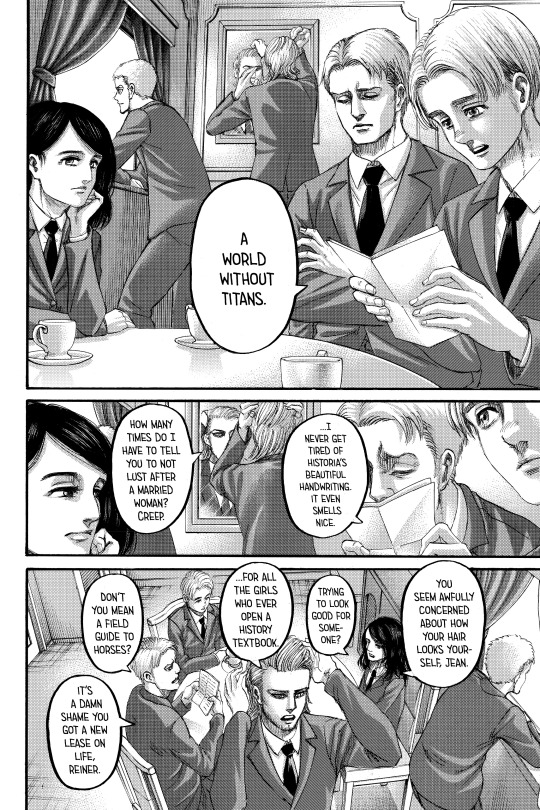
“They massacred Reiner!”
Yeah, can’t really say anything about this. I definitely understand the sentiment behind this scene, which I appreciate. It’s to show that thanks to his Titan being removed and the times of peace approaching, Reiner was finally able to shed the weight he bore on his shoulders and “regress” to his more carefree persona he had when he thought he was a soldier, instead of a warrior. I am very happy for him, and I think it’s a nice conclusion to his arc, that he’s finally happy, but it could’ve been portrayed in a less comic relief-y way. It just sledgehammers all his characterization. Feels surreal that we saw him attempt suicide a couple month ago in the anime and now he’s sniffing Historia’s handwriting.
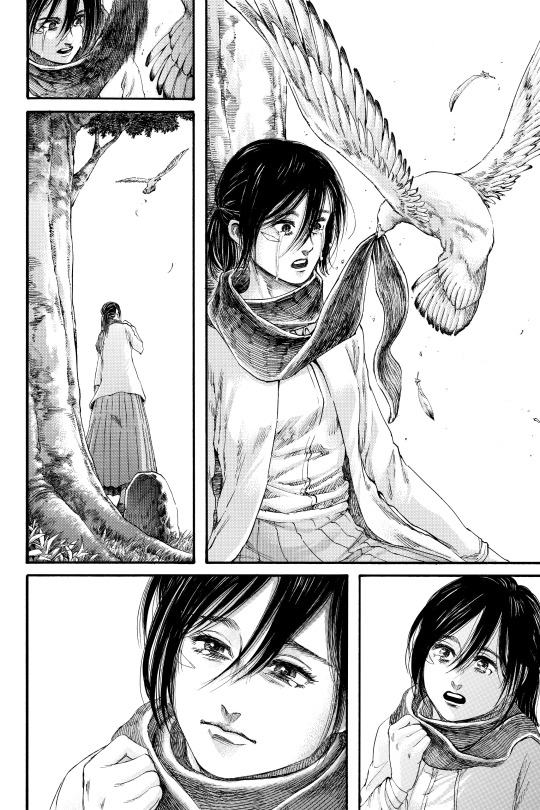
Guys, this absolutely sends me. There are people who unironically believe Eren actually reincarnated in a bird? Guys. It makes no sense, it violates every rule that Isayama established for his universe’s power system. How could he even reincarnate in a bird? Guys, c’mon, this is symbolical! Birds have been heavily used in aot to portray freedom, and this is a nice, poetic, symbolic way to show that Eren who lived his whole life chasing freedom and never actually got it, is finally free, like a bird, now that he’s dead. It’s also a pretty explicit nod to Odin, I think. Aot is heavily inspired by Norse Mithology, and I think there were some pretty clear parallels between Eren and Odin/Loki in the later arcs of the story. Eren has been shown to “communicate” through birds like with Falco in chapter 81, or with Armin in chapter 131. Emphasis on “communicate” because again, this is symbolic, I don’t think he actually spoke through the birds, he simply talked to them via paths, but birds are associated with Eren’s character (see also the wings of freedom, y’know?) and the shots were framed so to give the impression that he was talking through the birds, but he wasn’t. Symbolism. Anyway, I really think they were supposed to be a nod to Odin’s crows.
Aaaaand that should be it! Even though I most definitely forgot some other criticism on the chapter, it’s crazy the amount of negativity floating around. Hope I didn’t bore you!
#attack on titan#aot#shingeki no kyojin#snk#snk manga#aot manga#aot spoilers#chapter 139#aot ending#eren jaeger#mikasa ackerman#armin arlert#aot 139
24 notes
·
View notes
Note
Is Deus Ex Machina always a bad thing? People who didn't like the finale of Avatar are always quick to point out the lion turtle, but I think we both agree the ending was both emotionally and thematically satisfying, and to me that's the most important thing. But my question is: if it IS satisfying, is it still a DEM? After all, DEM usually carries this idea that the ending is ruined and it leaves a bad taste in your mouth, which the Avatar finale doesn't.
Coincidentally, I was thinking about this just the other day, although I wasn’t considering making a post on it.
I think what makes this discussion troublesome is that there are two very different operating definitions for “deus ex machina.” I tend to think of it in terms of the classical definition, so I don’t personally have any problem with it when it’s done well, but most people seem to be operating with something like the same kind of shorthand that has turned “Mary Sue” into a meaningless complaint.
The term translates to ‘god from the machine.�� Wikipedia can give a functional summary of how it was originally employed and the criticisms that arose about it even amongst those old-timey Greeks. My own take is informed by those origins and the Greek myths that I’ve loved since I first learned about them in grade school. In a setting where gods and magic are in play, I don’t see a problem with a god being so moved by the events of the story or the character of the protagonist(s) that they intervene in otherwise impossible scenarios. The key here is that the story needs to justify why the god/power is intervening here and not in all kinds of other situations; if a god comes along and raises someone from the dead, or hands over a magic sword, or whatever, then it needs to be clear why people still die and magic swords aren’t sold at every corner market.
The Lionturtle is indeed a deus ex machina in that it is a god-like power suddenly entering the story to hand Aang knowledge that he would not otherwise have been able to attain. However, AtLA firmly establishes that there are spirits in the world with god-like power. Hei Bai is the first at a relatively small scale (and was another spirit moved by Aang’s steadfast purity to enact a happy ending, hmmm…), but we also see Koh having knowledge that predates the existence of the moon and the ocean, Koizilla being able to smash a whole fleet with the help of the Avatar State, Wan Shi Tong being able to move an infinitely-large library between the spirit and material worlds, and an eclipse of the sun shutting down all Firebending. These are all powers that the normal humans of the setting do not have, but they are all exercised as a result of the intervention of the protagonists, so I think they’re perfectly fine elements to have in the story.
Just about the only thing that might separate the Lionturtle from these other examples is that it seeks Aang out, rather than the other way around. However, I think that’s an oversimplification of the situation, in which we had just gotten an full episode of Aang holding fast to his belief in the sacredness of all life, despite disagreement and harassment from his friends. He meditates in search of an answer, and it’s then that the Lionturtle reaches out. So I think Aang ‘earns’ its attention by his unique beliefs, his steadfastness in the face of painful opposition, and his action in seeking a solution via meditation.
Why does the Lionturtle not reach out to other people? Well, the only pacifists in the franchise are Air Nomads like Aang, and there’s possible evidence that they weren’t all as steadfast when push came to shove. However, I don’t think the fate of the world hinged on whether Gyatso or some other random Air Nomad killed an enemy while fighting; Aang is in a fairly unique situation in that regard. Theoretically, a previous Avatar might have faced the same dilemma that could have been resolved with Energybending, but as we saw of Yanchen, perhaps those Avatars didn’t really seek out another solution besides violence. The Kyoshi novel does a great job handling this, showing Kyoshi struggling with similar questions but finding her own answers that do not match Aang’s. Perhaps Aang really is the first person in an Age who merited the Lionturtle’s intervention. It helps that the intention at the time of writing was for it to be a technique only available to the Avatar, so that definitely limits the potential situations where it might have been relevant.
So we’re left with the question of whether Energybending itself conforms to the established rules of the setting. I personally think it does, quite handily. We saw examples of bending being taken away before, at least on a temporary basis. The death of the Moon Spirit takes away all Waterbending. The eclipse on the Day of Black Sun takes away Firebending for its duration. Ty Lee pokes Qi-points to disable bending even while leaving limbs otherwise functional (sometimes). Those all help clearly establish that bending is tied to the physical body, and specifically the Qi energies flowing through it. We see esoteric manipulation of those energies by way of Waterhealing, Lightningbending, and the time Aang’s spirit is knocked out of his body by physically crashing into a bear-shaped shrine/idol.
So yes, the Lionturtle is a newly-arrived god who imparts special magic to solve a problem that couldn’t otherwise have worked out so neatly, but all the elements are there to make it a workable plot element. If the Day of Black Sun had worked out, would people be complaining about how Deus Ex Machina it is for the gAang to stumble across information on an eclipse coming before the return of Sozin’s Comet that will take away Firebending and allow Aang to confront Ozai without training up to the a higher fighting level?
Well, not if Aang kills Ozai in that scenario, I expect.
The root of the way most people use ‘deus ex machina’ in modern times, I think, links to what Aristotle is said to have been alluding to in that Wikipedia article, and what Nietzsche also seems to be getting at. Specifically, they seem to think it’s better when a tragic story is allowed to end in tragedy, rather than an audience-pleasing happy ending getting tacked on in an act of weakness and cowardice. It’s fair to criticize this (I enjoy tragedy as well as happy endings, when it’s done right), but I think it can be taken too far into a desire for bleak endings in general. It would be more ‘mature,’ the thinking goes, for Aang to have to kill Ozai, be tainted, scream his angst to the sky, and show the audience that Life Is Dark even though it’s a trite message that doesn’t really follow from anything that came before. The thing about Tragedy that a lot of people forget is that it needs to be set up with as much care and earnestness as Deus Ex Machina, or else it’s just as hackneyed and immature.
AtLA is not a tragedy. It is not about the mistakes and flaws of the protagonists piling up into chaos. So the complaint about ‘deus ex machina’ doesn’t even really apply, according to the original controversy about it. Aang is not freed from the consequences of a flaw, because his desire for peace and life is something that’s consistently portrayed as good throughout the rest of the series. It’s built up in his culture, the appreciation for the Air Nomads that’s conveyed despite their flaws, the focus on his being the last survivor of a genocide, and even the subtitle of the series (providing you don’t live somewhere that got the much more generic “Legend of..” title that fits Korra’s more generic legend so much better). It’s not a tragedy if everything is working out until a last minute swerve when all the good things suddenly become bad.
That’s a Comedy, according to certain modern definitions. ;)
The only story that could end with Aang giving up his ideals to kill Ozai using the philosophy and ways of the Fire Nation is a story about how the Fire Nation is right- that morality is secondary to strength and necessity. And if that’s the story being told, wouldn’t it have been easier to just make the Fire Nation the heroes in the first place, slaughtering corrupt pacifist hippies who would rather we all die than fight to improve the world?
No matter how you look at it, people who criticize AtLA’s ending by calling it a ‘deux ex machina’ aren’t doing so by using the text of the story at all. They’re either glossing over how the setup for all the plot elements is all right there in the story, or else they’re doing exactly what the ancient Greeks criticize bad deus ex machina for in the first place by putting the wrong ending on a story. So most who use ‘deux ex machina’ as a criticism aren’t thinking about the nature of Story at all, I think. They’ve heard the term, mistake it for general criticism of ‘unearned’ plot points, and/or use it as justification for their own pretentious fascination with bleak endings.
So, to summarize my answer- yes, DEM can be a criticism in and of itself, depending on the definition in play. It can apply to AtLA, also depending on the definition in play.
But applying DEM to AtLA as a criticism just doesn’t add up.
75 notes
·
View notes
Text
Is It Really THAT Bad?
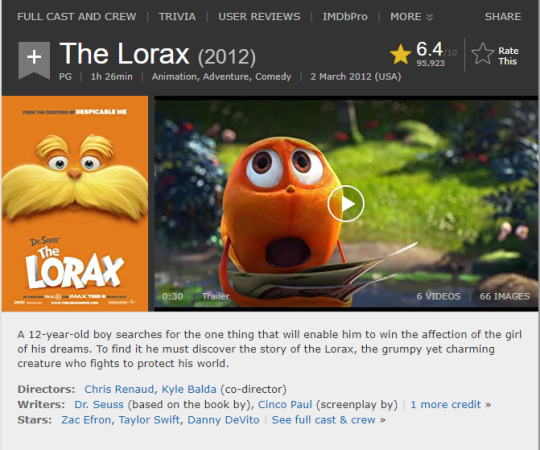
Dr. Seuss is no stranger to cinematic adaptations, and even less of a stranger to animation. And whenever Seuss gets animated, you can typically expect good things, as opposed to when his work is live action, in which case you can expect…
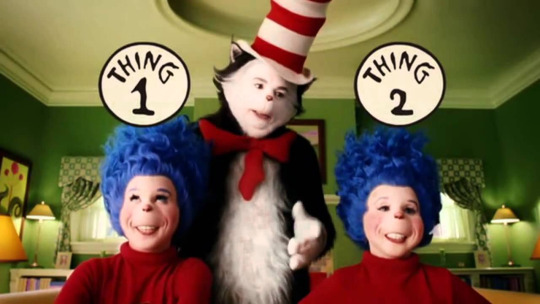
Yeah…
Anyway, imagine the excitement people must have felt when the creative team behind Despicable Me and the writing team behind the underrated gem Horton Hears a Who got together to do a fresh new take on The Lorax! This was in Illumination’s heyday, before they ended up showcasing that they’re more interested in churning out cheap products for maximum profit, so there was plenty of hope that this could be good. Then came all the commercial tie-ins.
youtube
Now, this alone shouldn’t be indicative of the final product. Maybe stuff like this is just a bunch of suits horribly missing the point of the original story! Maybe the actual film will be better! Well… while the film was no flop, and while it certainly got a better reception than most of the films I’ve talked about here, the film was derided by many for being an extremely shallow and lacking adaptation that adds unneeded junk to a story that didn’t need it in such a way that ultimately dilutes the message. It turns a story that operated on shades of gray and turned it into a cartoonish spectacle that would make even Captain Planet blush. Not helping was the rabid fanbase on Tumblr who shipped the Once-ler with… himself… or Jack Frost… forever tainting the film in the eyes of those on the internet.

Things got so bad eventually even the [REDACTED] Critic reviewed the film in his usual over-the-top, accentuate the negative style, and as some people still treat his word as gospel, this has most likely colored the perception of the film. So while it’s certainly not to the same level of infamy as the usual subjects of Is It Really THAT Bad? I still wanted to put this movie on here and ask one simple question:
How ba-ah-ah-ad can it be?
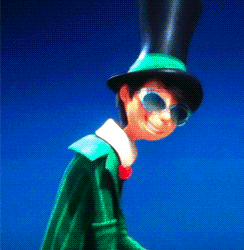
THE GOOD
So let me just get it out of the way: the movie’s villain song, “How Bad Can I Be,” legitimately is awesome and is frankly one of the best villain songs ever. No, I’m not kidding. It’s just a fun, rocking number with some neat visuals, and while it’s a shame the cut rock opera-esque “Biggering” is probably the better song, this one is definitely more fun and meme-worthy. Shake that bottom line!
youtube
Now, the casting is, for the most part, pretty fantastic. Minor characters like the grandma played by Betty White are a lot of fun, but really, the main piece of awesome casting is Danny DeVito as the titular Seuss creation. DeVito as the Lorax is just so incredible, perfect, and inspired that it boggles the mind how anyone could possibly come up with such amazing casting.
As far as antagonizing forces in the film go, the Once-ler’s awful, vile family are enjoyable in a “love to hate” sort of way. While it’s certainly kind of iffy that they felt the need to give the Once-ler more of an excuse for his actions beyond just simple greed, it isn’t so bad that what they came up with was familial pressure. In fact, they’re actually much better at antagonists than O’Hare, the actual villain of the film, and the fact the movie give him so much focus despite having such fascinating characters that would have had a really great thematic purpose; hell, they should have been the rulers of Thneedville instead og O’Hare! There’s so much untapped potential with these, quite frankly, very interesting characters.
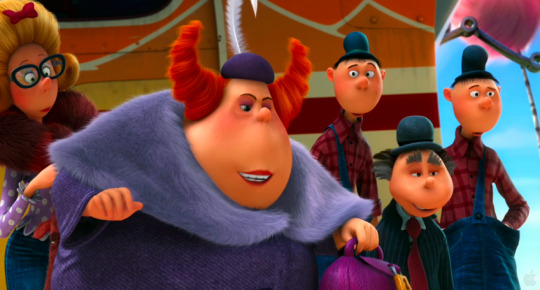
I guess I should say the Once-ler is a pretty decent character in and of himself, but he very much suffers from the same problem the Jim Carrey Grinch does – he’s a good, enjoyable character in his own right, but he’s not a very good Once-ler. In fact, he at points borders on “in name only” territory. Still, he does have a pretty solid arc, and that villain song slaps, so… I think he’s solid, and Ed Helms does a good job voicing him.
THE BAD
Jon Lajoie, while in character as his misogynistic moron rapper MC Vagina, said this:
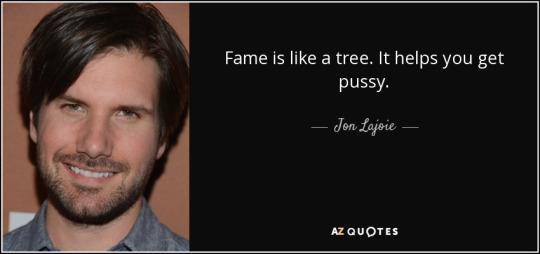
When I first heard this lyric, I didn’t understand it… but his words were a prophecy, because that is, in all honesty, the plot of this film. Our flavorless protagonist Ted really just wants to get the Truffula trees back so he can get into the pants of the local smoking hot redhead hippie, Audrey. It gets to the point where Ted’s motivations are so boring and shallow that Audrey actually would have made a far more interesting and compelling protagonist, seeing as she already has an inexplicable knowledge of the trees and cares about nature. When they already changed so much in the story I don’t see why they couldn’t just make the protagonist a girl while they were at it. As it is, she barely has any presence and feels like a waste, which becomes all the more awful when you know she’s being played by a stunt casted Taylor Swift instead of an actual voice actor or even an actor period. At least Ted is Zac Efron, an actual actor, though he doesn’t do a particularly good job himself.
Then we have our villain, O’Hare. O’Hare has all the subtlety of a Captain Planet villain but none of the cheesy goodness and fun. Sure, Rob Riggle does some good delivery and gives O’Hare some memetastic moments, and sure, his selling of canned air is oddly prescient of things that happened in real life in India (though technically President Skroob Spaceballs beat him to the punch by a few decades) but it doesn’t really redeem O’Hare from being an excessively weak villain who is shoehorned into the plot solely to turn the story into a black and white morality tale. It… doesn’t work at all. What also doesn’t help is that O’Hare has an absolutely repugnant character design, looking like if Edna Mode got mangled by a sixteen wheeler and left in a ditch on the side of the road.
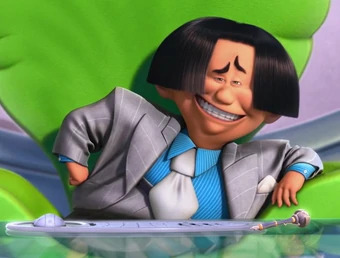
Finally, this movie just doesn’t really respect the story to any great degree. As mentioned above, it waters down a story that presented arguments from both sides and, while still ultimately showing the Once-ler to be wrong and shortsighted, did have him make some valid points. Here, the story is presented as there being a clear cut good and evil in a horrendously unsubtle and unpalatable way. Yes, we get that extreme deforestation and overuse of resources is bad, you don’t need to beat us over the head with it. It doesn’t help that the film also crams in a bunch of cringeworthy pop culture humor that really doesn’t add much to the story; say what you will about the anime scene from Horton, at least there was a bit of substance and reason for it. Having characters sing the Mission: Impossible theme is just making a reference for the sake of making a reference.
Is It Really THAT Bad?
So I’m gonna say that I don’t particularly find this movie to be good, per se. It’s very dumbed down and more than a little undermined by the various brand tie ins. It is a poorly executed black and white morality tale that was crafted from a very deep and engaging piece of children’s literature, and on that level, I don’t think this movie works even a little bit. Still, there’s some enjoyment that can be mined from this, particularly from some of the more so bad it’s good moments, as well as DeVito’s performance and some actual good moments of story and character. There’s some stuff to like here if you dig a bit, but really, I don’t think you really should have to do a deep dig into The Lorax to get some enjoyment.
Overall, I wouldn’t really say this movie is totally bad, but it’s definitely not good, either; it veers more into the territory of “so bad it’s good,” which is a shame but also kind of refreshing. It’s definitely an interesting film to talk about, and there are a few things about it that work, but ultimately it’s not enough to really raise the film to the level of the classic animated Seuss adaptations or even to the level of Horton. At its best, it’s okay, and at its worst, it actively undermines its own messages. I think the 6.4 it has is pretty fair… maybe a bit too fair, if I’m being honest. I’d give it something like a 5.7 or 5.8.
Again, it’s not the worst thing ever like some might tell you; hell, the adaptation of How the Grinch Stole Christmas Illumination would go on to make is probably a worse movie. But it still doesn’t really do anything that adds to the story its telling, and it ultimately comes off as saccharine, forgettable childish fluff. It’s really a harmless movie, but it’s still probably gonna grate on anyone who holds the original story in high esteem. The {REDACTED] Critic was a bit hyperbolic in his review, but I do think he was right in principle. This movie feels like a calculated, corporate adaptation meant to be as inoffensive and marketable as possible much like every Illumination film post-Despicable Me. And if there’s one thing The Lorax shouldn’t be, it’s “inoffensive and marketable.”
#Is it really that bad?#IIRTB#review#movie review#The Lorax#Dr. Seuss#animation#animated movie#Illumination
20 notes
·
View notes
Text
let’s talk about the themes of the Sly games
Sly Cooper and the Thievius Raccoonus (2002):
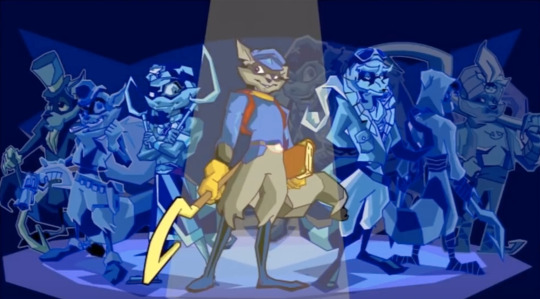
Paris: this might not be the game’s main theme but it’s the theme that is most omnipresent. Paris is the glue that connects everything together. it immediately has such an impact on the player, even though it’s just the tutorial and the gang’s base of operations. Sly being a thief but also living in Paris just sounds so right, like it’s the way it should be. it fits.
The Thievius Raccoonus: this is the main theme and what provides the game with its premise. it’s the book that needs to be glued back together and its importance is highlighted throughout. almost every level has a page included so we’re constantly reminded of its significance. the skills we earn by retrieving the main ancestors’ pages elevate the gameplay and force the player to respect it. other than that it’s a clever way to spotlight the ancestors and establish that Sly does come from a long line of thieves.
Family: this doesn’t need much explaining but i’ll do it anyway. we start off with Sly’s parents getting killed and him landing at an orphanage where he creates a new family for himself with Bentley and Murray. you’ve got 3 different types of family: (A) Connor and Sly’s mom getting murdered and Sly’s aim to avenge them, (B) Bentley and Murray being true brothers when Sly was left with no one (i’m tearing up), and (C) the ancestors, which are explored more in-depth through the theme of The Thievius Raccoonus. Family as a theme explores Sly’s motivations and drive, even though Connor’s role is minor, especially in comparison to his role in Sly 3
Morality: Sly 1 is rudimental in its gameplay. it was a little game with a big promise at the time it was released, hoping to serve Sony and the Playstation 2 with a worthy mascot and an even worthier title. but right off the bat the player is bombarded with a shit-ton of lore about the world Sly lives in and how he operates. we immediately find out he’s an antihero, an honourable thief who has a code of conduct. this comes into stark contrast with the game’s villains who are basically filthy crooks. thief takes down thieves and the theme of Morality is SP’s attempt to make the player distinguish between good criminal and bad criminal. Morality as a theme is spotlighted immensely in Cold Heart of Hate when Sly saves Carmelita because he truly is the good guy, but also when it’s revealed that what’s been keeping Clockwerk alive all these years is the lack of morals and the hatred. the game establishes Morality as the outlining theme of the entire series, placing Sly on a pedestal because he’s honourable. morals trump hatred, so fuck off Clockwerk (even though ‘perfection has no age’ might be one of the coolest lines in the game lol)
Sly 2: Band of Thieves (2004):

Paris: this is the theme from the first game but on steroids. like make it x10. when you take the plot of Sly 2 and boil down to its core, it turns out to be a full-on race against time to save Paris. it provides both a nod to the first game and a sense of closure at the end: the game begins in Paris and ends in Paris. It’s both a setting and a catalyst, and it is absolutely brilliant in the game. you spend most of the game globetrotting, away from home but as soon as you find out ClockLa is on her way to unleash her psychotic brain waves and turn the city evil, you find yourself at the edge of your seat, caring more about Paris than anything else. it’s omnipresent and powerful and i don’t know why but i love it.
Spice: if you wanna be my lover. here’s an amazing replacement for drug trafficking as a plot device in a children’s game: spice. the spice trail is what pushes the narrative forward but also gives the gang something to face before the pieces fall into place and the larger scale of things is revealed. before ClockLa steals the show, spice is the main antagonist in the game. it brings the villains together, leads the gang from one location to another, provides some memorable missions and obstacles (Spice in the Sky and a raged, spice-infused Murray). but it’s not to say that it fades away in the long-run. Spice is actually the subtle thread that connects the episodes together but also is significant to the final master plan of hypnotising Paris.
Deception: obvious one here. Neyla pretending to be an ally is the major example. we’ve got the Contessa pretending to be loyal to Interpol, we’ve got Arpeggio seemingly being the mastermind behind everything (which he kinda was until he wasn’t), we’ve got the whole evil plot reveal on the spice, we’ve got Neyla ripping off Arpeggio on her journey to become the most well-written villain in video-game history. lots going on here. overall great theme. on a wider scale (and i’ve touched on this before in some recent posts) we’ve got SP deceiving the player into thinking the plot is all laid out at Rajan’s ball until it all turns to shit and nothing goes as expected. Appearance V Reality is a sub-theme that pops up when Bentley fights Jean Bison and Bison constantly underestimates Bentley until the turtle fucking blows his lights out. it’s not an instance of Deception per se, but it’s worth mentioning
The Past: Clockwerk’s return makes this a theme instead of a motif. before ‘saving Paris’ becomes the main objective, it’s Sly’s determination to prevent Clockwerk’s revamping that kicks off the game’s events. the events of Sly 1 play a pivotal role here as they lay the groundwork for the plot of Sly 2. it’s not just Sly 2: The Sequel. with its own set of characters and an intricate story it becomes its very own thing. but Clockwerk is the link that connects everything.
Morality: this one sneaks up on you in the game’s second half and just bites you right in the ass when you least expect it. Contessa, who until her boss-fight seems to be just another selfish spider bitch witch, manifests into this advocate for Sly’s inner demons through simple dialogue. fucking brilliant. ‘You’re an ignorant child playing dress-up in his father’s legacy’ (in my opinion, the best line in the entire series) kicks it all off. and then the theme becomes obviously present throughout. it explores the fine line that Sly walks between robin hood and scumbag thief, it shows how the villains are down-right criminals who want to benefit from their crimes, it cracks black and white into a million pieces because in a single game there are like a million layers of good and evil: Barkley at the very top as the authoritarian white, Carmelita as a sympathetic cop who tries to grasp onto her own code of ethics while occasionally running with the thieves, Sly and the gang as antiheroes, the villains as... villains, and Neyla as the embodiment of satan. it’s a scale and the game spotlights this. i had a different bullet point for Justice but i think it falls under Morality. basically, Carmelita’s story arc in Sly 2 deals with blurring her views a bit and re-defining justice
Sly 3: Honour Among Thieves (2005):

Ancestry (Cooper Vault): this is what the game is all about, or at least the premise. after stitching the cottdamn book back together by the end of the first game, Sly 2 doesn’t give any attention to the Thievius Raccoonus. in fact, Sly 2 exists on a completely different plane, using its amazing plot to elevate itself away from the lore of the first game. ancestry is rarely mentioned. flashforward to Sly 3, where SP takes us back to the mythos for a new caper involving a new reveal: the Cooper Vault. what we thought we knew about the ancestors is thrown out the window to pave the way for this mystical place where the Coopers buried their secrets and their loot. i’d like to point out that the theme of Ancestry is great and all but SP does a shitty job in spreading it throughout the game. whilst recruiting the new gang members we often forget why we’re doing so and it’s not until the last episode of the game that we get the fulfilment of the theme’s promise. it’s also worth mentioning that the theme pops up in A Cold Alliance when Tsao is comparing himself to Sly and he speaks of his ancestors but we somehow get the feeling that his ancestors were all colossal jerks like him and had absolutely 0 honour
Family: this is not the same as Ancestry. the new gang members could have very well been distant with each other if not for the adventures that made them bond. Bentley’s fascination with the Guru, Murray being the Guru’s apprentice, Bentley falling for Penelope, Penelope and Panda King helping Murray with the van, Panda King and Sly working alongside each other to kill vampire mantises and the Crusher. these are all moments that helped sell the ‘group of thieves’ aspect of the game. but Family also explores the bond of the original trio and how, even when they face their differences (Bentley and Murray living in the shadow of Sly), they can still make it through, even stronger than before. other references here might include: Panda King and Jing King, Dimitri and the Lousteau diving legacy, Dr. M and McSweeney being Conner’s “sidekicks”
Honour: this replaces the theme of Morality from the previous two games as the situations the characters face allude to honour (doing what’s right for the greater good) rather than morality (black and white, good vs evil). what i mean by that is SP making an effort to distinguish why Sly is a different thief and ultimately an antihero. this was sorta explored in the previous games by having Sly put an end to the villains’ various operations but the overall plot overshadowed those instances. Sly 3 on the other hand fully explores the theme of Honour by including the word in the title and having the gang save the day in every episode. stopping harm to the environment (polluting the Venice canals, destroying the Australian outback), helping Penelope come to terms with her inner demons by encouraging her to drop the facade of the Black Baron, saving Jing King from forced marriage, etc. the theme also ties into the theme of Redemption (below) but what i’d really like to point out is that Carmelita gets in on it as well. i can’t think of a more honourable moment than when she finally, after 3 games, puts the petty cop bullshit aside and comes to Kaine Island with her squad to save Sly from Dr. M. she makes Sly’s battle her own and doesn’t give up, showing up at the very end to save him from Dr. M’s horrific boss-fight (ugh)
Deception: although not as major as in Sly 2, i’ve said this time and time again: Flight of Fancy perfectly encapsulates the theme of Deception. Penelope dressing up as the Black Baron is not the only instance of deception. you’ve got Bentley and Penelope blowing their online avatars out of proportion, you’ve got Dimitri who was initially a villain finally turning sides, you’ve got an episode card full of sunshine and bright blue and gold fonts for a hub that’s all gloomy rainclouds. beyond Flight of Fancy, i can think of a few more instances: some Shakespearian shenanigans when Carmelita disguises herself as Jing King, or when the gang doesn’t reveal their Dead Men Tell No Tales plan to the player and we’re left thinking that Sly is going to get eaten by sharks
Redemption (Choices): speaks for itself, really. this one ties in with Honour and is a sub-theme, maybe a motif. we’ve got Murray’s desire to redeem himself for feeling guilty over Bentley’s accident. we’ve got Dimitri and the Panda King joining the gang after previously being villains in the series, and eventually redeeming themselves through helping with the heist. we’ve got Penelope redeeming herself as the Black Baron by joining the gang. i also named it Choices because these characters chose to redeem themselves. Choices are all over the game, whether its the lack of free will or the sacrifice characters make: Jing King isn’t in a position to choose whether or not she gets married during her capture, Sly sacrifices his cane at the very beginning of the game to save Bentley and then jumps in front of Dr. M’s shot to save Carmelita (!!!)
Closure: or the lack of, smh. SP’s trilogy comes to a close and therefore the theme has to exist even if the game doesn’t provide the player with mass satisfaction. Sly finally gets together with Carmelita, Bentley finally gets over his fear and self-doubt and lives the good life (with Penelope), Murray kicks off his racing career, and we get happy-ever-afters for the rest of the gang as well
#ya boi is FAMISHED#this beats any sly essay i've ever written#i'm exhausted bye#sly cooper#sly MF COOPER BITCHES
78 notes
·
View notes
Text
My Hero Academia Season 5 Episode 22 Review: Sad Man’s Parade
https://ift.tt/eA8V8J
This My Hero Academia review contains spoilers.
My Hero Academia Season 5 Episode 22
“Even if you stumble in life, you can pick yourself back up again.”
“All it takes is one bad day to reduce the sanest man alive to lunacy.” That’s the central question that the Joker poses in Alan Moore’s Batman: The Killing Joke, but it’s a concept that’s been prevalent throughout the histories of many of My Hero Academia’s villains. The events of “Sad Man’s Parade” explore how Twice’s life in particular has had a dark domino effect that progressively pushed him to his life of crime. This style of oppressive morality play can begin to feel melodramatic when it’s overdone, but what’s important about Twice’s situation in “Sad Man’s Parade” is that it also continually pushes the message that it’s never too late to turn your life around and that redemption can be right around the corner.
This is an optimistic virtue that’s evaded and crushed Twice in the past, yet it’s something that many of the head figures at the League of Villains are currently wrestling with in the tail-end of My Hero Academia’s fifth season. “Sad Man’s Parade” is an episode that lets a lunatic run the asylum, but the operation is such a success that maybe the League of Villains should let unstable trauma victims lead the way more often.
Twice has always been one of My Hero Academia’s most fascinating and frightening characters because of the frayed state of his mind and how the use of his Quirk appears to only make him progressively more unstable. The series has never necessarily made previous comparisons between the character and DC’s Clown Prince of Crime, but in terms of karmic mayhem it’s apt. “Sad Man’s Parade” pulls the trigger of removing Twice’s mask, but then sends the character into a dangerous tailspin when he confuses Skeptic’s puppets with himself and believes that he’s the one that’s hurting Toga. This difficult realization makes Twice even more erratic than normal. He’s a character who’s always stuck in some level of an identity crisis, but “Sad Man’s Parade” depicts him at his very worst. And then he reaches peak performance.
This glimpse of the villain’s rock bottom is only fitting since the episode largely fills in the blanks surrounding Twice’s origins. This information is satisfying and helpful regarding Twice’s future, but it feels even more appropriate following the looks into Shigaraki and Toga’s backstories that have been provided in the previous installments. This “My Villain Academia” arc continues to unpack the layers on My Hero Academia’s deadliest characters and “Sad Man’s Parade” results in another disturbing, emotional home run for the anime.
There’s a compelling juxtaposition in play through “Sad Man’s Parade” between Skeptic’s control over his puppets and Twice’s own duplications and how these comparable abilities contrast in slight, yet vital ways. Ideally, Skeptic wishes to absorb Twice’s Quirk and have a replication and puppet Quirk that’s even more advantageous than what he currently wields. This sinister master plan involves eradicating what’s left of Twice’s fractured mind so that his Quirk can be used to proliferate Re-Destro and make a whole team of copies for this volatile villain. So you know, it’s basically Multiplicity, but with a whole lot more genocide.
Every detail that’s provided on Twice’s past is fitting and succeeds in its mission to humanize this hyperbolized wild card from the series. Twice only started to clone himself in the first place because he suffered from crippling loneliness, not because he possessed any malevolent intentions to improve his Quirk. It’s such a simple, human piece of backstory that does more for the character than what a verbose monologue would provide. Twice is currently stuck in an incredibly dangerous situation, but the initial desires that push him down this path to villainy are highly relatable.
Much like with what’s learned about Himiko Toga in the previous installment, “Sad Man’s Parade” presents Twice not so much as an evil mastermind whose purpose is revenge as it paints him as a scared, hurt victim of circumstance. He finds comfort in the League of Villains because he’s vulnerable and without confidence, just like Himiko Toga, not because he’s fueled by a bottomless pit of rage. What’s just as moving as the circumstances behind the genesis of Twice’s Quirk is him finally regaining his confidence in the department. Twice has been paralyzed in fear over his Quirk after he witnessed some of his clones eliminate each other, planting seeds of doubt in his mind if he’s actually the original version of himself or just another clone.
This is some of My Hero Academia’s deepest material and “Sad Man’s Parade” provides Twice some closure in this area that’s incredibly cathartic and also allows him to passionately embrace his powers again as he gets his groove back. It manages to be just as inspirational as the moment when Shoto Todoroki takes ownership of the fire side of his Quirk and he moves out of the shadow of his father’s trauma, which is saying something for a secondary villain. It’s so satisfying when Twice’s clones are able to overpower Skeptic’s puppets and he can take solace in his powerful Quirk rather than allow it to control him through fear and doubt.
There’s a powerful symmetry to the episode where Twice’s growing confidence mirrors the unshackled nature of his Quirk, leading to the extraordinary culmination of Infinite Doubles. My Hero Academia wisely doesn’t undersell this moment and it’s a visual extravaganza as the streets are literally overrun with hundreds if not thousands of Twice copies. The icing on the cake is that the rest of the League of Villains can’t believe their eyes over Twice’s comeback.
A promotion may be on the way for the masked weirdo who seems to have left some of his emotional baggage buried under countless duplications. “Sad Man’s Parade” functions as a celebration of Twice, but also his strong connection with Toga and why they need each other. It ends with both of them more empowered than ever before and it makes both “Sad Man’s Parade” and last week’s “Revival Party” two complimentary sides of the same story.
This is Twice’s episode to win, but Dabi, Mr. Compress, and Spinner get to show their skills against the Meta Liberation Army’s ice-based Geten. The battle brews in the background and it still offers some fun variety that breaks up the episode’s focus, but it’s largely inconsequential. It just provides more stunning action and an opportunity for Twice’s story to breathe. The final stage of Twice’s plan where Twice produces clones of Shigaraki, Dabi, and Mr. Compress is the perfect climax to all of this even if Re-Destro’s Tetsuo-esque Akira powers make swift work of them.
Re-Destro and Clone-araki’s fight is brief, but well choreographed and benefits from how it’s just as much a battle of values as it is of Quirks. Re-Destro continues to preach over how the very perception of Quirks in society is broken and beyond repair. On that note, it also sounds like Yuki Hayashi’s theme music for Re-Destro kicks in once he reveals his motivations to Shigaraki and it’s a heavy, intimidating tune.
There’s a broad vein of wild comedy that runs through “Sad Man’s Parade,” but it’s also a surprisingly brutal episode that doesn’t shy away from the visceral nature of breaking Twice’s arms and legs, as well as what nearly happens to Toga. My Hero Academia has steadily grown more adult, especially with how far it’s willing to go with its violence, but it means even more that this prolonged focus on the villains doesn’t present a sanitized version of the anime’s action.
Similarly, Shigaraki and Twice are so specific over how they’re the ones to kill Re-Destro and that they want his death to be personal. Their involvement in his execution is as important as the outcome. It’s significant that they’re reached such a place of animosity and aggression for their enemies. Shigaraki currently seems to exhibit more hostility towards Re-Destro’s Meta Liberation Army than he does for All Might and U.A. High’s heroes, which is fascinating.
cnx.cmd.push(function() { cnx({ playerId: "106e33c0-3911-473c-b599-b1426db57530", }).render("0270c398a82f44f49c23c16122516796"); });
Every time that My Hero Academia devotes an episode’s worth of backstory to a character it runs the risk of spoiling what makes that individual compelling in the first place, yet “Sad Man’s Parade” is an effective example of how character development and plotting can work together. Twice suddenly evolves from a loose cannon into a top tier villain in a manner that doesn’t just feel believable, but is also genuinely inspirational. The series’ prolonged shift in perspective over to the bad guys continues to be one of My Hero Academia’s best decisions. The stakes that surround the conflict between the League of Villains and the Meta Liberation Army are so engrossing that a return to Deku’s schoolyard shenanigans suddenly seem a lot less important.
The post My Hero Academia Season 5 Episode 22 Review: Sad Man’s Parade appeared first on Den of Geek.
from Den of Geek https://ift.tt/3DKzdQm
0 notes
Text
ANNOTATED BIBLIOGRAPHY
Cuddy, Luke. BioShock and Philosophy : Irrational Game, Rational Book. Chichester, West Sussex, Uk ; Malden, Ma, John Wiley And Sons, Inc, 2015.
This book is one of my favorites for discussing the inherent political and philosophical issues in games. The Bioshock franchise has a lot to say about rejecting control and programming, be it the programming of polite society (“would you kindly”) or the more metaphorical rejection of a tyrannical parent’s expectations (Elizabeth Comstock’s entire character arc), and these myriad messages are parsed and considered through numerous philosophical and sociological frameworks. It constantly questions the ethical and moral implications of the many decisions a player can make in these games and pushes many varying views on the arcs of the different characters. It is a fascinating look at how games can help develop a critical mind towards structures in power through consistent diegetic writing and references to prominent (and wrong, in Ayn Rand’s case) thinkers in its scant dialogue.
Dyer-Witheford, Nick, and Greig De Peuter. Games of Empire : Global Capitalism and Video Games. Minneapolis, University Of Minnesota Press, 2009.
Yet another book to feature leftist views on the history of gaming (this entry was written like third to last chronologically), this one is more concerned about how technology that was once used to code subversive counter-culture gaming experiments in the 1970’s has since been expropriated to further capitalist and neocolonial interests and goals. As visual mass media like films and video games and TV has since supplanted print media (posters and print ads), all sorts of insidious agendas and troubling trends can and have been implanted subtly into what we normally consume, such as the glorification of warmongering and conquest games that then link through to the literal army website for enlistment.
The book itself is a critique of late stage capitalism and neoliberal interests that have made up the backbone of real-life simulation games like Second Life and America’s Army, and a galling look at the slimy ways we are fed ideology through games.
Guillaume De Laubier, and Jacques Bosser. Sacred Spaces : The Awe-Inspiring Architecture of Churches and Cathedrals. New York, Abrams, 2018.
Growing up in a majority Catholic country with a highly devout grandmother and many aunts and uncles subscribing to that grift masquerading as a religion meant getting dragged to upwards of 40 church ceremonies and a lot of subtle proselytizing and covert conversions. All it did for me was make me fall in love with the gaudy excesses of its aesthetic sensibility. This book feeds my irrepressible need to look at Gothic architecture and stained glass and informs a lot of my aesthetic choices. The photography of church interiors and descriptive passages of the historical significance of Gothic architecture in relation to churches constantly informs my many aesthetic choices as both a goth and an agnostic/Jewish designer fascinated with the aesthetics of high Catholic camp and excess.
Hernandez, Patricia. “The Cyberpunk 2077 Crunch Backlash.” Polygon, 7 Oct. 2020, www.polygon.com/2020/10/7/21505804/cyberpunk-2077-cd-projekt-red-crunch-youtube-jason-schreier-labor-the-witcher-3.
DISCLAIMER: While I am aware of the opinions surrounding Polygon and its purported corporate agenda, I have elected to source this article regardless, as it is reporting on an important aspect of the industry and the future we as designers have to look forward to as crunch becomes more and more normalised.
This article details the ways that CDPR (CD Projekt Red) treats its designers and developers, with six day work weeks and broken promises of ending crunch. It also shines a light on how netizens and players respond to negative reporting of this trend and how worryingly apathetic and downright disdainful the responses are. Exploitation isn’t new in any industry, but it scares me that someone could die of overwork and the people they’re slaving away on a game for wouldn’t care because “that’s just the way the industry is”.
Kakutani, Michiko. The Death of Truth. London, William Collins, 2018.
This text is invaluable for anyone who cares about how biases in the media they consume changes and warps news based on what they care about, while also addressing the trend of fully fabricated news to scare less informed (and often conservative) constituents further into their holes of prejudice and uneducated opinions. As a media student it’s fascinating to consider, but as a person living in the world it’s downright necessary. The sooner a person is aware of the biases in the media they consume, the faster they can learn the importance of diversifying the voices they listen to and address the blind spots in their information pipelines, and this book is really good at diving into the kind of language and rhetoric to be on the lookout for to parse out bias, which keeps me on my toes about the media I want to put out in the world.
Löwy, Michael. “Capitalism as Religion: Walter Benjamin and Max Weber.” Historical Materialism, vol. 17, no. 1, 2009, pp. 60–73, www.urbanlab.org/articles/moneyspeak/Lowy%202009%20-%20capitalism%20as%20religion.pdf, 10.1163/156920609x399218. Accessed 28th November 2020.
This article attempts to interpret one of the socialist critic Walter Benjamin’s reflections on capitalism as a societal framework, and how it had at the time of writing (1920s) come to resemble something closer to a religious cult. The unpublished paper makes allusions to Max Weber’s book The Protestant Work Ethic and The “Spirit” of Capitalism and Ernst Bloch’s (then unpublished) Thomas Münzer as Theologian of the Revolution.
Currently I believe this critique of capitalism has only become more relevant. He couldn’t have predicted the ravenous cultlike behaviours of Apple fanatics but that’s nothing more than the end point of the behaviours he was critiquing a hundred years ago come to roost. It’s important for people involved in games to understand this and take it to heart if we don’t want the industry to be more overrun with triple A yearly sports releases and the latest instalment of “grizzled white guy with gun and traumatic backstory”.
Skal, David J. The Monster Show : A Cultural History of Horror. New York, Faber And Faber, 2001.
This work is basically a historical look at the western media’s depictions of its greatest monsters, often discussing contextually as part of the cultural zeitgeist of any given time. It’s a fascinating look at the intersection of fear and semiotics in our current cultural landscape and additionally details the creation and eventual decline of the Hayes Code and normalisation of queer-coding villains, although my personal viewpoint on the matter is that it would have benefited the text to have delved into monsters and their depictions across nonwestern cultures, because fears (outside the unknown and darkness) aren’t really universal, and it would have made an interesting contrast to see the differences between a traditional western vampire and a manananggal, but I digress.
Unrelated to its cultural discussions, it also serves as a pretty scathing report of theatre writer pettiness and old Hollywood drama.
Weber, Max, et al. The Protestant Ethic and the “Spirit” of Capitalism and Other Writings. New York, Penguin Books, 2002.
This seminal work by turn of the century German theorist Max Weber proposes that a line exists between the puritanical beliefs that heavily relied on working oneself to the bone to be considered a moral person in the eyes of the lord and the eventual rise of industry and capitalism in western Europe. He juxtaposes the Protestant beliefs in productivity for its own sake to wash oneself clean of sin with the way that work under capitalism is presented as a way to contribute to society and, in some instances, repent and atone for transgressions and wrongdoings, arguing that one indelibly led to the other.
As a socialist (and non-Christian) myself, I believe I should be able to critically analyse the ethics of working myself (and others) to the bone, and why we’re taught it’s good and moral to push ourselves to physical and mental exhaustion. I don’t want my work to be created under conditions that are both spiritually and physically crushing, and this text is paramount to the analysis of so-called worker-oriented games companies and their policies towards worker welfare.
Woodcock, Jamie. Marx at the Arcade. Haymarket Books, 2019.
As a socialist myself I found this book to be a great insight into gaming as transgression from the systems of hierarchy around us. In a world where all anyone cares about is money, capital and the almighty bottom line, the idea that taking time for yourself is a revolutionary act fighting capitalism is definitely an interesting one. Yes, there are systems to serve within the game, but it’s a fascinating look at what we can consider transgression from the oppression of real life. Gaming is, according to the writer, an inherently unproductive activity where capital is not served (unless you work for a warcraft gold farming operation), and therefore a revolutionary action where you put yourself first. It can be an outlet for passion, and in some cases a coping mechanism for mental issues. It really made me hopeful in the industry I want to work in. (Disclaimer: I realise this barely scratches the surface of the book but it’s what stood out to me the most and what resonated with me the most.)
Wright, Alexa. Monstrosity : The Human Monster in Visual Culture. London, I.B. Tauris, 2013.
Another look at monsterhood, this time analysing our fears through personhood and how we as a culture project our fears on those who are different from us. I did a lot of research on monsterhood and how we see the other as inherently frightening for my final paper for university (which I will eventually upload as a reflective post because I still stand by a lot of it), and I think it’s valuable to know why we’re afraid of things so we can begin to unlearn harmful misconceptions of people who aren’t like us. As someone who wants to work in games art (focusing mainly on character art), I personally want to challenge the fear of the other through my work, and I want to use signifiers that are traditionally thought of as fearful to create more thoughtful art and hopefully help humanise that which was once considered hateful and gross.
#since apparently i needed one big post for it#i like how i laid mine out better BUT I GUESS I GOTTA DO IT THIS WAY FOR THE SAKE OF SUBMISSION#researchandinquiry#frickin making me redo my whole tag with one post#oh well#annotatedbib
0 notes
Text
Summer 2017 Anime Overview: Made in Abyss
With this post, I will finish off my overview of the Summer 2017 anime season.
In my previous posts, I discussed what I considered to be the weakest anime I watched, then the middling anime, then some Really Good anime....and with my last post, I discussed one of the best anime I watched this season, Princess Principal.
Now here’s what I consider to be the other best anime of the season:
Made in Abyss

Made in Abyss takes place in a town whose way of life revolves around a mysterous abyss. The abyss has several levels, full of incredible creatures and properties, and only the best explorers can go deep into the abyss and live- and those who go all the way to the bottom are unable to come back to the surface ever again.
A young girl named Riko is an explorer in training fascinated with the abyss. She’s eager to follow in the footsteps of her mother, a top-ranked explorer who has been missing in the abyss for a long time. She discovers a robot boy named Reg, who came from the abyss but has no memory of it. Together, they decide to journey into the abyss to find Riko’s mother and discover Reg’s origins.
Hoo boy. Okay, so this show is very, very good. But do NOT let the cutesy art style fool you. IT IS DARK. and brutal. and bloody. It will absolutely not be for everyone. There’s a ton of shit to warn for. But for some of you, the positives will way outweigh that.
Made in Abyss is a show that just really blows me away with its world building. If you want intricate and gorgeous fantasy worlds (that are still terrifying and full of gritty danger), man does this deliver. Each layer of the abyss has so many rules and scary pitfalls, there is SUCH a variety of creatures and technology and the world and society Riko comes from is so well thought out in general- it’s detailed world building on the level I don’t think I’ll ever be able to do as a writer. Add a gorgeous soundtrack and breathtaking animation, and you’ve got yourself a masterpiece.
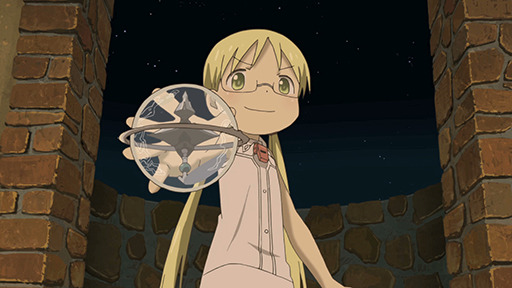
And that’s not even getting into the characters. Riko is an incredible and inspiring protagonist. The sheer force of curiosity and willpower is overwhelming. She idolizes her mother and is determined to follow in her mother’s footsteps
She’s drawn to the abyss and as the story goes on, her connection just gets more and more complicated. She’s very smart and scrappy and is an observer, a scientist, and an explorer. She’s cautious and reckless at the same time, and her drive to succeed is almost scary. She’s also very blunt and ill-mannered and doesn’t have much in the way of boundaries. She’s willing to undergo any trial and endure ANYTHING to complete her goal. Definitely one of the toughest ten year olds in all of fiction.
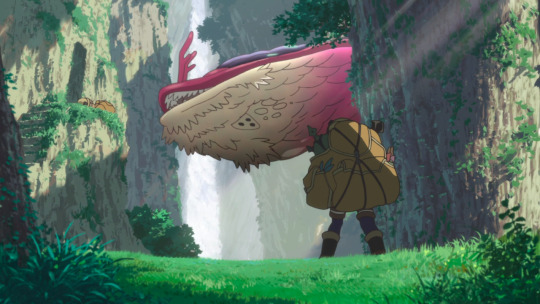
I also really like that she’s the product of a mother-daughter legacy. She’s driven to both meet and be like her mom, who was one of the top explorers of all time- she was called “Lyza the Annihilator”. Riko’s dad (a lower-ranked explorer) died when she was young and is very incidental to the narrative and her mother left her in the care of others so she could go on a journey in the abyss.
This REALLY excites me, because it kind of narrative is always a father-son narrative. The Absent Parent Who Left to Go on a Journey/Do Something Important and the other Parent Who is Just Dead- in most narratives the former is the dad and the latter is the mom. Men are the ones who get to abandon parenthood and do world-saving/cool explorer shit that’s relevant to the plot, women are the parents who just end up dying. See FMA, HXH, like almost any shonen, really. There’s a reason if a dad is absent he’s typically doing Plot Relevant things and if a mom’s absent she’s dead- women are expected to nurture, men can do other things.

But no, for once it’s the woman who’s the important and active source of mystery. And this time, it’s a young girl who’s determined to partake in the adventure and find out about her missing parent, and what’s more, she wants to live up to her. It’s a serious mother-daughter legacy story, and anyone who follows me knows how excited I get over those rare, rare stories.
And the mystery surrounding Riko’s mom is HUGE. in the middle of it all is Reg the robot boy. Reg’s also a great character, and despite being a super strong robot, he comes across realistically as a struggling, vulnerable child. it’s easy to feel for him.

As a super-strong robot, Reg tends to do most of the fighting and stuff and there’s an emphasis on he feels a need to physically protect Riko- however, I think that’s balanced out by the fact he also wouldn’t survive if it weren’t for Riko’s strategy and direction. Riko is basically Reg’s battlemaster. Plus-there’s plenty of physically strong women in the show- Reg’s greatest challenge is a very terrifying, morally ambiguous woman and Lyza is implied to be a hyper-competent fighter too. Riko’s age and human vulnerability seem to be why she need protection than her gender, within the context of the show’s world. Riko is definitely scrappy and willing to step up to fight as well, and I have no doubt she’ll grow a lot as the story goes on.
Also, as a child, Reg quickly finds out it’s pretty impossible to protect Riko and himself on his own. Which is where the third protagonist, Nanachi comes in. Nanachi doesn’t come in until the end of the show, and it’s hard to discuss them without spoilers, but they’re an interesting character- smart, competent, loveable and with one hell of a backstory. They are also an intentionally gender-neutral/agender character, which is nice. There’s also another character with an ambiguous gender identity in the show, and they’re hecka cute.

The world of Made in Abyss is a vibrant and full one, full of intrigue and many incredible surprises and mystery upon mystery. But it’s also an incredibly brutal world. The show makes it clear from the beginning the Abyss is a harrowing place full of dangers, and the show REALLY doesn’t let you forget it. There’s an episode of the show- and everyone who watches it knows what i’m talking about- that is so incredibly disturbing, both in the sense of uncomfortable-to-watch gory body horror and general emotional discomfort- that I actually had to cover my eyes a few times. It is rough.
And every indication is that things are going to get worse rather than better on that front. Nanachi’s backstory in particular is both horrifying and heartwrenching. It’s brutal and bloody and I nearly teared up.
I wouldn’t blame someone who considered Made in Abyss torture porn, because it is very intense suffering shown very rawly, and especially uncomfortable because it happens to children.

However, it doesn’t quite feel like torture porn to me and I’m not sure why. Maybe because there’s always a sense of hope that a lot of torture porn lacks. Maybe because there’s kind of a focus on the harshness of nature that the brutality seems to go with it.The show definitely wants you to be horrified and feel things, but it seems like part of journey rather than suffering for the sake of it. The character’s determination and struggles seem to be at the center of the suffering.
And the suffering is never so much and so relentless that I give up hope or stop caring about the characters, which are problems i ran into with narratives like Game of Thrones or Attack on Titan. I still care about these kids and feel they can come out of this journey scarred but stronger. That may change later in the narrative, but that’s the sense I get so far. The gorgerous, intriguing elements of the show balance out the pain and darkness for me right now.
However, that’s not going to be the case for everyone. What constitutes torture porn is a very ymmv thing. So someone sensitive to that absolutely should not watch this show, I cannot overstate how hard it can be to watch.

Another big thing to warn for with the show is some unfortunate fetishistic undertones with the young cast. The characters tend to end up naked every few episodes- and while it’s not framed lasciviously and seems to go with the brutal natrualism of the world, when it’s coupled with enough uncomfortable running things it becomes a bit suspect.
One running bit is an element of sexual humiliation with these young characters-specifically with Reg it’s noted several times that he does has a penis despite being a robot- the first time it’s mentioned is in the context of Riko examining him, where she blithely mentions stripping him, seeing it and testing whether it would break- this seemed to be a bit of a character note highlighting Riko’s naivety in her lack of understanding of boundaries and sex stuff and how she views things in a rather detached and scientific way. But it got downright inexcusable when an ADULT character who should know better checked whether Reg had one and humiliated him, which was done as a matter of fact lighthearted thing, despite being pedophilic sexual assault. Alongside this there’s this running idea that the main punishment in the orphanage Riko comes from is being “strung up naked”.

There also a few times sexual elements are introduced among the young characters- a hot springs scene where riko reacts with confusion to Reg apparently getting a boner at the sight of her naked, or one where Reg mistakes Nanachi taking off Riko’s clothes to operate on her as something sexual. These moments are hugely uncomfortable to watch considering the characters age, and there’s no reason they should really be included- while again, the moments aren’t constant and aren’t framed lasciviously, the fact they exist makes nudity that would otherwise have just struck me as incidental seem suspicious.
For me, it’s mostly ignorable- other than the hot springs scene and the inexcusable bit with the adult and Reg it honestly would have gone completely over my head- but it’s something to watch out for. Other people have also pointed out some other potentially fetishistic stuff that again, went completely over my naive head (i really often forget piss fetishes even exist). I think how blatant the whole thing is is really ymmv, but yeah, defintely something I have to mention, especially since it involves potential pedophilia.
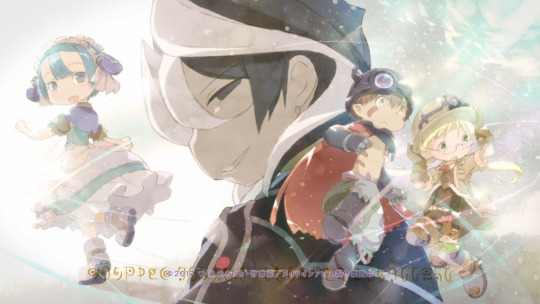
It has some major bumps, but Made in Abyss is honestly a robust, beautiful, fascinating story I wouldn’t hesitate to call a masterwork. The visuals, the characters, the soundtrack, the worldbuilding, the details- it’s stunning. It’s not among one of the stories that has carved out an official place in my heart yet, but I wouldn’t be surprised if it really did just click with me as it went on. I can’t wait to see more of it, and if you think you can stand the elements I mentioned earlier, I encourage you to give it a shot.
#made in abyss#anime overview#summer 2017 anime#riko made in abyss#reg made in abyss#nanachi#riko#reg#lyza the annihilator
78 notes
·
View notes
Text
Ghost of Future Past
“So, it’s your last day here?” I asked the senior lab tech training me for the day. I asked myself as well, for the umpteenth time.
I’ve been contemplating on handing out my resignation letter since the first week of my first “real-world” job. How unappreciative, right? I should at least endure a year!
Well, that was my plan even while I was still an intern. When my ghost of future past would haunt me, I would remind myself to:
Experience the actual med tech life, save up, and maybe love the job on the process! Plus, almost everyone who knows about my dual citizenship, says I’m so lucky to have an easy path to their ideal job. I would just be like that exemplar alumni who now lives the American dream life.
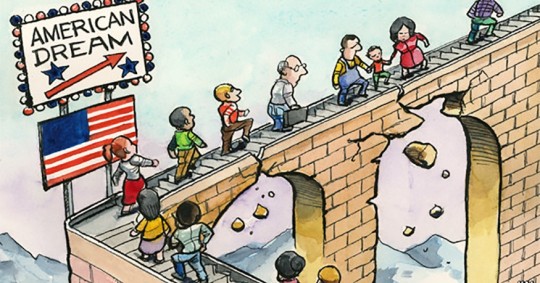
The American Dream life was my new aspiration. The former one was "to become (ehem) a NeUroSurGeon" when people asked the ultimate question after high school. The younger me - who didn't know her limitations yet - thought operating on brains would not only make me rich, it would also make me cool.
Why not? I was a salutatorian. I could do anything!
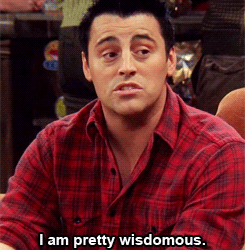
Being a neurosurgeon was the best field I could think of that is related to my interest.
I was (and more so am!) very fascinated by a person's values, morals, emotions, and way of thinking. I thought all of which has a common denominator: the mind, the human brain. I took up the supposed best pre-med because I was for sure taking the straight path of studying brains as med subspecialty.
However, after being placed in environments where I was not always at the top, and often at the bottom instead, I somehow had let go of the Neurosurgeon “dream”.
It turns out that I can do anything, but not everything.
(Click Video Link below to see if how I would be if I were a doctor.)
https://streamable.com/0ly3pn
I seriously considered shifting to Psychology at the end of my third year. I even consulted the college’s guidance counselor (which was of no help because they only cared about students who are suicidal or, with absolute failing grades). There were days I balled my eyes out because my study table was far more interesting than the lessons I had to master.
I hated myself for changing so much. I thought that my prudent high school self would be more suited for my college life. She was studious and focused. She knew her priorities. She seemed wiser too.
She once said on her salutatory speech that “This stage is our port, and our diplomas are passports to our respective life destinations.”
With those flowery words, one would think so. But I realized then that my high school self was also none the wiser.
For her, life’s destination were stability and success. She only knew she needed to escape. So, she bought the ticket for the number one tourist spot for premeds. She didn’t care if she barely heard about her first stop; wrote Bachelor of Science in Laboratory Medical Science instead of Medical Laboratory Science on her enrollment form. (I applied originally and got accepted for Psychology. I only had a full spell out of the course during enrollment hehehe)

Apparently, I bought the wrong ticket. Still, I endured my premed major. I was already in it. I didn’t want to waste the money, time, and effort I invested for the past 2 and a half years.
It helped that my mom’s mantra “You can do it! Ikaw pa! Fake it ‘till you make it!”, my aunt’s “Your problems are nothing compared to what we’ve been through.” and my grandma’s “Quitting is hopelessness, and hopelessness is the devil’s work. You just need to pray more.” were constant reminders that made my ghost hide somewhere in my subconscious.
Plus, finishing one more year of my bachelors, find a good job as soon as I can, and finally be an independent and professional adult sounded more ideal than “spending more time in school.”
To become one less mouth to be fed from the many who are so dependent on my mom (and in turn equals dad), to be able to give back to my parents (who I feel so indebted for since I'm not exactly my step dad's responsibility), and to my Mama Lola as soon as I can was a better motivation than “I want to help better people’s lives.”
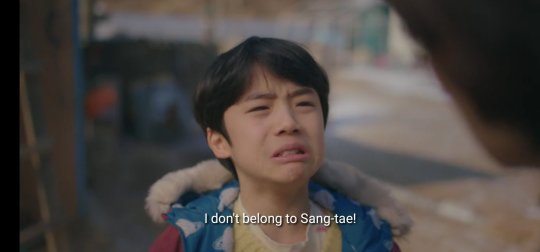
I didn’t know I was a Gang Tae. The loved ones I look up to are Gang Taes. In turn I became one. My motivations were worthy of what I presumed was a (for the lack of better words) heroic sacrifice.
I wanted to take my Mama Lola away from our seemingly perpetual suffering that close-knit Filipino family seem to excel at.
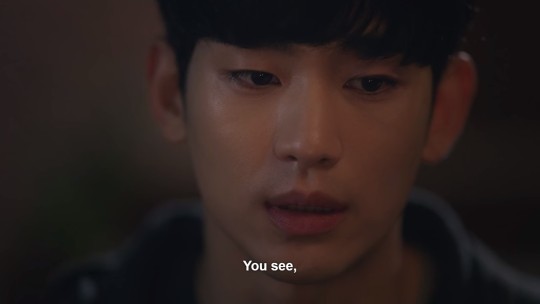
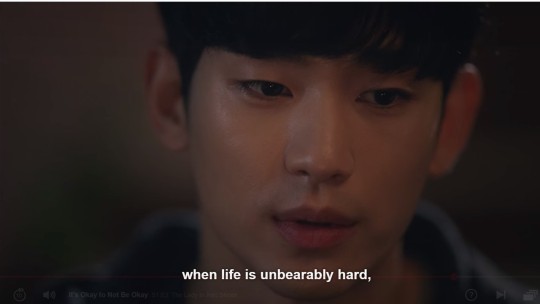
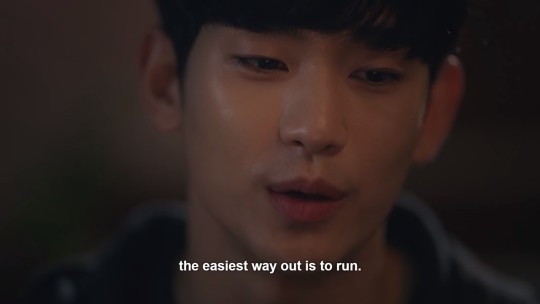
I was afraid to be stuck or get swept by my current circumstance. I still worried for my past, that the changes that lead to the present weren’t genuine, and people would eventually fall back to their old habits – their unchanged selves. Most specially, I feared becoming just like them.
I had to be independent as soon as I can.
AS SOON AS I CAN.
Now some parts of Soon has come:
· finish my bachelors
· get a good job
Parts of Soon that hasn't come, yet:
o Becoming an independent adult (I still live with my parents, and they I still provided for my meals. Heck, my dad still even drops and picks me to and from work!)
o Take my Mama-lola away from her stressful sons by encouraging her to go here in the US (I know she'd be more comfortable when I'm with her in a country where she repeatedly described her life would be as FOREIGN, LONELY, and ISOLATED.)
o When worse comes to worst, be financially stable enough that no matter how messed-up my family and extended family may become, I will be able to survive on my own without bother.
You see though, after I checked the first two, my ghost of future past kept knocking on me; keeps knocking on me...
Particularly when internet algorithm keeps suggesting personality and career tests with results that exactly fits (and unbeknownst to many) what I truly value , and shows me this quote:
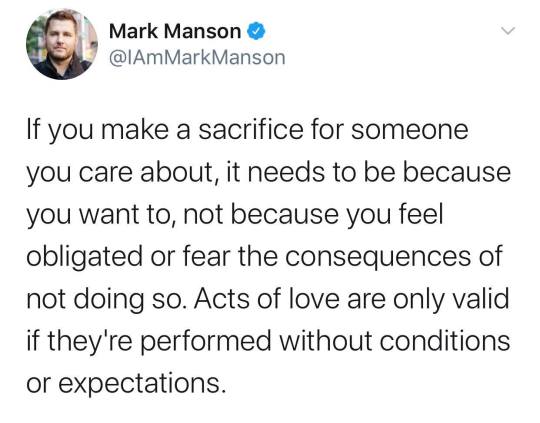
Or Vlogs like: (watch whole vid at the end of the post.)
And this Ted Talk:
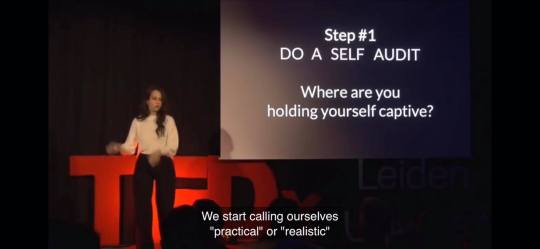
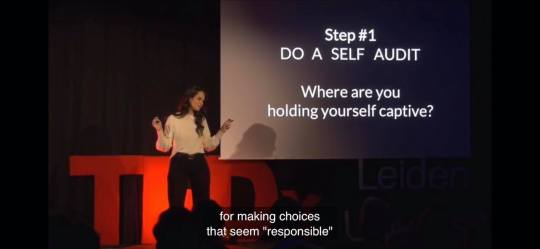
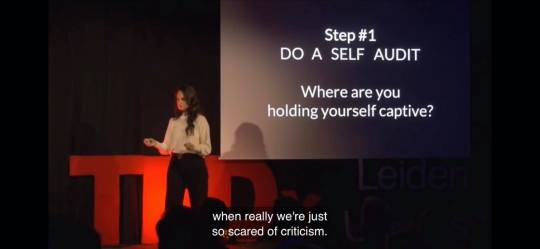
My mom asked me several times, “What's your plan? Don't you want to grow?” When I was still applying for jobs.
I had different a answer. But if I were to say what I truly felt I would reply:
"Yes, this is part of the plan. But I don't know if I'll grow here - if I even want to grow. This plan is a practical and quick sacrifice. I'm just following it. Not pursuing it. Of course! I want to grow! *pun intended* but not on this career path."
Hence, my ungrateful thoughts of burning my first bridge even if I barely started building it. I really thought I’d learn to love it when I start living it, specially if it’s the “ideal life”.
Apparently, like the words affect and effect, “The Ideal” and “The Fulfilled” - what’s “interesting” versus what’s “valuable” - are often confused. This most specially occurs when one’s justifications root from fear (or need to escape) and envy (or envisioning someone else’s exemplar life.)
“Fake it till you make it.”
“A shallower problem…”
“Quitting is hopelessness…”
“You’re so lucky, you’ll just become like her..”
“As soon as I can!”
These are the words that make me treat what I find valuable, as something that I should fear. I try to ignore it, but my mind conjures almost everything I see, or that happens as a sign – as its face, as my ghost.
My coworker training me (among all four trainees) on her last day, and finding out that after 30 years in our laboratory she is still transferring to the company she first wanted to work for, is another face of my ghost.
A ghost telling me that, no matter how far I’ll make it, if I faked my way, in the end I’ll still long for what I truly value.
That my dilemma isn’t shallow. I am aware of my privileges. I may have it better than others, but it doesn’t mean what I seek is invalid.
That quitting, or changing a path isn’t hopelessness, or laziness. Sometimes, it’s the most unexpected detour I didn’t think I need.
Above all, it won’t make me the kind of person who is among my greatest fear of becoming. (More of this on another story.)
That I don’t want to become “just like her.” I am grateful, and I am indebted to what others call as “luck.”
Nevertheless, I want to become the person I wished I had when my mom was still a mess. I want to be the guide that my younger cousins, and other neglected children and young adults can confide to and can listen to. I want to be the person whom adults can trust and lean on as if they were children, so they can become better adults. I want to be the mentor I wish I had in school, and I wish to have in life.
That I should stop thinking “As soon as I can!” Because, I am not delayed. I should not be in a rush. I don’t need to be my or society’s “ideal”. Whatever I decide to do, it is best to be done at the present since it’ll only fundamentally affect me (unlike when I’ll act on it if I have children, or debts.)
Or am I getting ahead of myself again? Am I putting meaning into nothing? How can I find work that is related to what I value, especially during a pandemic? Should I hand in my resignation?
I ask myself these as I try to conclude this blog (Again! I thought I arrived at a conclusion yesterday), on an unexpected day off because dad’s car suddenly died last night (for the first time since they got it, and as I was waiting for another sign), while eyeing Viktor Frankl’s “Man’s Search For Meaning” (the book just got delivered this afternoon.)
***Originally written on: 08/17/2020***
youtube
0 notes
Link
COMMENTARY:
Here's the thing to understand about this commentary since I began it in 1981 is that I am literally a League of Nations Wilson and John Bolton's entire career has been dedicated to restoring the primacy of the American foreign policy established by Henry Cabot Lodge's success at vetoing the League of Nations.
If you want to understand the difference between an Eisenhower-Romney Republican and a Joe McCarthy Conservative. We are poster boys for the politics in the GOP coming out of Nixon-Brezhnev Detente and Mao-Nixon Leakey Umbrella Summit. I went to Vietnam as an instrument of whatever POTUS had in mind for the safety and security back in The World.
When I got to Vietnam in 1970, just after Kent State, John Bolton was in his last year of his draft deferment as a cadet in the Harvard ROTC program and he was scared shitless of going to Vietnam (which is another way of saying he had other priorities than military service, except he had a military obligation from being able to avoid being drafted for an undergraduate degree, just like West Point.
John Bolton, being a certified white guy with extensive political connections and a daddy rich enough to pay for Harvard Yard, found a slot in a National Guard unit and was in for 6 years, like GW Bush and Dan Quayle, protecting the women and children on the home front. I appreciate his service: The World had been nice and snug for everyone when I got back and John Bolton was waiting for me in an agenda committed to blow up everything Eisenhower set into motion with his 1956 Presidential Platform, including Nixon's foreign and domestic programs. That's what Supply Side economics is all about.
This all goes back to William F. Buckley's heroic self-image of standing on the wave of the future, shouting "STOP!"
Buckley was what the Soviets referred to as "reactionary" and "anti-revolutionary", These were the people the Kymer Rouge classified as a political crime in the Killing Fields.
Here's how things get a little twisted when you are dealing with applied Fascism: in Vietnam before 1962, the Counter-Insurgency processes of the Green Berets was literally "anti-revolutionary" behavior in terms of the godless commie cocksuckers in Hanoi who were losing to American democratic socialism and the entrepreneurial society of Paris after the war. In 1962, the Republic of Vietnam and the Republic of Korea were both works in process, but they exhibited very similar digestive transitions going from the powers-that-be at the end of the war to post Sigmund Rhee and the Diem brothers.
My thesis long before I actually got to Vietnam was that America lost the battle when we assassinated the Diem brothers. It is a moral failure we are still paying for because assholes like John Bolton in the Joe McCarthy Conservative coalition that has assembled itself, ideologically, around Buckley's 1960 Fascist manifesto, the Sharon Statement. Of course, two years later the Students for a Democratic Society published the Port Huron Statement, a civil-rights/anti-war manifesto that adopted the political stragety of the Trotsky Insurgency Process, one of the things the Green Berets all over the world were deliberately committed to neutralize with the Counter-Insurgencey technologies David Petreaus resurrected to begin to re-orient the military aspiration towards the peace-keeping and stability operations of conflict resolution, In other words, the SDS set a process in motion leading to violent revolution and, by 1969, the political power in the class struggle between the Jocks and Greeks on one side, which had dominated the American campus since Jefferson was at William and Mary and what we called "Green Baggers" at IU to identify the liberals and non-greek nerds who were on campus to get an education and carried a local symbol of a wonderful waterproof green sachel so you could get to class in the rain.
I had a green bag and I was both a Greek and a rugby jock. I was actually at IU to get an infantry commission, but I had to carry academic classes because they didn't have an ROTC degree. I expected to go to Vietnam when I started my freshman year and I had as little to do with campus politics as possible, but by the time I graduated, the biggest stud in the SDS, Guy Loftman, was Student Body President and the Tucker Carlson-Kellyanne Conwary demographic were the neo-"Green Baggers".
John Bolton was part of the Tucker-Carlson-Kellyanne Conway demographic displaced by the Trotsky Insurgency Process. I wasn't part of either campus coalition. As an Army brat, campus society was just an extension of the school yard social agitation I did my best to avoid in the civilian community, When you are an Army brat, you are in a state of constant social turnover and the sort of socio-politico patterns of the civilian community off-post didn't exist in the Army community. It was like the difference between "West Side Story" and the crew of Starship Enterprise. In Germany, we had evacuation drills. In 1962, the Army evacuated all its dependents in 24 hours after the Viet Cong started tossing hand grenades into Saigon movie theaters. And the cultural revolution on campus from 1965 until 1969 was just more of the crap I avoided as best as i could in high school. It was Black Board Jungle with a Diliverance drawl.
I had a couple of classes with Guy Loftman: one in military history and one in an english seminar and we had a certain nodding acquaintance. I had to come to class in my ROTC uniform of the day one day of the week and it was never an issue. The core justification for the anti-war movement was draft avoidance, or, at least, the essential emotional driver of the movement. I still find it hard to believe that white Americans growing up playing football wouldn't want to soldier for a couple of years, just to play in the big leagues. So, I didn't buy their bullshit any more that I did the crap coming out of people like John Bolton and Pat Buchanan and that whole strata of chicken hawks who have been committed to blowing up everything I went to Vietnam to serve and protect. Including their personal life style of the American Endless Summer. I mean, you can compare the careers arc of John Bolton and Bret Kavanaugh and that was the expectation of the Jocks and Greeks of the Tucker Carlson-Kellyanne Conway demographic in 1965 and, by 1969, Guy Loftman had turned things on the American campus on its head, like Marx proposed to do to Hegel.
And, when I got back from Vietnam and moved to the District of Columbia, the GOP had two distinct agendas: the critical path set into motion by George Washington and a reactionary path diverging at a right angle from the critical path, the political agenda of the Joe McCarthy Conservaties emerging from William F. Buckley's Young Americans for Freedom dedicated to turning Eisenhower's 1956 Presidential Platform on it's head. In the Nixon White House, there were the Eisenhower-Romney Republicans (including Nixon) and the Plumbers, the pre-cursor to the Joe McCarthy Conservatives who came to town with Reagan and began to dismantle everything that was connected to Nixon's domestic and foreign policy programs.
People like John Bolton. Bolton is trying to fade into the background noise of the liberal media enough to get back unto the talk show circuit to flog his PAC. He is a very skilled bureaucrat but he is sheer poison for the Presidential critical path currently being dangerously diverted by Donald John Trump*.
Here's the thing: the influence of Peter Navvaro's agenda to regress the American economy to 1955, when an American businessman coul get a blow job in Berlin for a loaf of bread, is evident in Donald John Trump's fascination with the size of the nuclear arsenal and his proposed budget to restore the aresenal to its level in 1969. It's one of those things that just grabs him by his pecker, like the idea that a tariff war fills a similar need, And John Bolton and the Joe McCarthy Conservatives made POTUS Pencil Prick possible.
John Bolton is a major generator of the disinformation of the Joe McCarthy Conservative communication strategy, He's like David Brooks (not David Brock): he will never not be a crypto-Fascist operative. He's hard-wired the way he is. It's the Fascist Voluntary Derangement Syndrome: the ability to deliver ideologically driven narrative without the slightest existential basis in their sleep.
This is why John Bolton is able to commit his political career to advancing Henry Cabot Lodge's anti-League of Nations foreign policy agenda. Like Richard "Dick" Cheney, America's favorite war criminal, John Bolton has never felt the lash of combat on his own back. 911 gave America a itty-bitty taste of the lash of war and it should have scared Joe McCarthy Conservatives straight, but, like their predecessors who though the Bay of Pigs was a good idea and were involved in the Diem assassinations, the only lesson they seem to learn is the practicality of plausible deniability in a strategy of accountability avoidance.
Like Bill Kristol and the members of the Lincoln Project, John Bolton has created a lucrative career with a wake of policy failure that includes the invasion of Iraq, the 2008 Mortgage crises and, now, Donnie the Duckass. What needs to happen is for Clinton voters to recognize and ignore the voice of disinformation coming out of the Joe McCarthy Conservatives and vote for the (Democrat to be named later). Any of these men and women will do just fine if only because they aren't Joe McCarthy Conservatives and their administration will begin to flush the Joe McCarthy Conservatives out of the federal government, beginning with the Schedule C presidential executive appointments. Whatever success the economy is enjoying under Trumponomics started from the Bush-Obama structures that set the current Bull Market in motion. I mean, it will be a real novelty for a Democrat administration to inherit a national economy from a Republican administration that isn't a total basket case if Potus Pencil Prick hasn't fucked things up so badly, globally, My vote, at this moment, in a rational world, would be for Biden's resume and the Green New Deal Platform, which has been hanging fire since 1981, when Joe McCarthy Conservative assholes like John Bolton began installing Supply Side economics.
Right now, Mitt Romney is the last of the adult leadership in the GOP that worked on the legacy critical path of Eisenhower's 1956 Presidential Platform and he's the only one who voted for the values I went to Vietnam to advance and John Bolton began to destroy while serving in the National Guard.
Mitt Romney and I are the last of the Eisenhower-Romney Republicans and John Bolton is a poster boy for the Joe McCarthy Conservatives
0 notes
Text
Okay, I’m gonna babble a bit about playing Oneshot now!! So umm, under a readmore if you dont like long posts. Sorry!
* Man, the setting is just so FASCINATING and MYSTERIOUSSSS! You’re sent to save this mysterious world, and its kinda this unique setup where you start the game with the thing you need to fix it, and you just need to go on this big journey to get it to where it needs to be. And its all fun and cool and surreal cos you’re literally carrying The Sun, which for some reason is a magic lightbulb?? This place is so strange and charming like that, there’s this mix of robots and magic and stuff thats just accepted as normal here. Like... humans MADE robots, but all this weird mechanical-biological combination stuff was always here and they react like ‘WTF’ if you mistake it for a robot. It kinda makes a lot of sense that they’d have such advanced robots even in the most rural areas when the laws of their reality seem to already work like machines in the first place. I mean, some humans just randomly have objects for heads?? That’s just... a thing?? Big metal heads?? ‘Of course I’m not a robot’. This is just like some sort of medical condition I guess?? i was surprised when I finally actually saw a robot with an object head in the very last area, lol. ‘WHOA BUT YOU LOOK LIKE A HUMAN’ xD
* And there’s the whole biological system and economy and etc revolving around blue/green/red phosphor, which is why losing the sun means the end of the world for these people BUT they’re able to survive for a while without it. This stuff just exists that absorbs sunlight and can store it like batteries, but its like a naturally occurring tree sap?? Big glowy cyberpunk tree sap, from trees with neato glowy patterns instead of leaves. And from ALL SORTS OF other biological sources, like being honey secreted by microscopic starlight shrimps, and their land equivelant the phosphor flies in the next area. Its like if solar panels were things you could mine up from fermenting goddamn apples! ITS SUCH A UNIQUE COOL IDEA!!!! And its got so much detail into this worldbuilding and it all looks so pretty and surreal to see these things scattered around the world providing the light and power for every town you find. Its like... there’s always a realistic reason why this person is here, there’s never a single gap in the constant decision to ALWAYS explain the phosphor source for every single room. And it just looks super pretty cos you have these glowy things stacked on bookshelves and in lil tanks and in lil jars and just ITS GREAT how you can even see the differences in each area’s version of the technology?? Like in the Barrens where everyone is robots, there’s very little light at all. All the phosphor sources are mined and installed into generators that in turn power all the robots. They dont need as many light sources cos they emit light themselves, and their vision probably doesnt even work the same way as humans. So its really subtle and sad that you only see a large number of the jar lightbulb thingies in areas that are said to be abandoned human settlements. Its so messed up to think that the robots are trapped by their programming to keep refilling useless lights in places they dont even occupy, wasting their limited power source even faster... And in the Glen because its a more rural area that provides all the farming for the more technologically advanced main city, you just see more ramshackle home remedies for phosphor. There’s robots and technology everywhere but they arent really used by the locals? its like all these facilities have been built on their land by the Refuge citizens, and all the robots are government workers who dont even talk to the citizens. And guards keeping people from going to the Refuge until they work up enough money to afford a visa, and then theyre kinda never allowed to return, it seems?? That would have been messed up even when the world was functioning correctly, but its super disturbing now that we’re all doomed and the Refuge is literally being advertised as the only safe place to live. Which just makes it sadder when you get there and its suffering just as many problems as everywhere else! But just seriously, if it actually WAS the only safe place and they’re sitting here sustaining themself on work from the Glen and the Barrens and keeping all these people out even though without them the place wouldnt frickin BE safe to begin with! GAHH MORAL QUESTIONS, I LOVE THIS WORLDBUILDING GAHHH. And its so nuanced because none of this stuff is ever outright stated, all the characters act like its a normal way for society to work, and Niko is so young they dont really understand it anyway. Its just this sort of thing you realize after a while and it makes it all even sadder. And especially because all the people in the Refuge are just ordinary citizens too, and theyre not even living in the luxury they were promised to begin with. There isnt even really any clear person who upholds the status quo, they dont seem to have any government? Its just like everyone is running on the laws and programming left behind by someone long gone, and they dont have the capacity to question it. And its falling apart because nobody even understood that person’s reasons for making things this way in the first place. Like how the Barrens was meant to be an operation to extract blue phosphor to deliver to the Refuge, but the degredation went faster than expected and all the humans had to withdraw back. So now its just a bunch of robots continuing this mining operation with no end goal, as they slowly break down. They’re just expending energy to mine more energy, which sits there waiting to be delivered to no-one, because their programming is all ‘humans first, robots have no free will’. They’ll keep doing this stuff thats supposed to benefit humans, rather than looking after themselves! And at least they have Silver the one robot who broke her programming and acts as sort of a mayor to the rest. But she’s chronically depressed and alone and even with her help they werent able to fix the generator until you came along, and even when you fix it you’re able to bring some robots back to life but others are just empty background scenery that’s too broken to move T_T And... like... it seems that robots literally cannot become ‘tamed’ unless they interact with humans? Nobody seems to be able to explain how you ‘tame’ a robot, but it seems they gradually learn to step outside their programming and form more of a personality through just... being loved enough. And seriously even if they say they’re unable to feel emotions, all the un-tamed ones still seem to express their own personality and its just like they’re stuck unable to disagree with a bunch of laws that keep it restrained. I FEEL SO SAD FOR THEM! I miss the prophetbot, they were my first friend in this world and i cant do anything for them except give them one nice conversation before i have to move on. They’re unable to move on! Their programming literally stops them from leaving that one tutorial spot, stops them from talking to anyone else except the destined hero. the other robots talk about how prophetbot struggles to try and talk to them when they visit them, but they have ‘great difficulty’, and just... goddd, how chipper and helpful they are to give you the tutorial... god i was the first friend they had in centuries... I hope they get some sort of epilogue maybe in the credits??? SORRY, WHERE WAS I? Oh yeah THE WORLDBUILDING IS REALLY GOOD And anyway, the Glen people live on raw phosphor in sort of local homeopathic equivelants. No phosphor generators outside of the areas that’re occupied by Refuge robots doing research and such. They just have cute lil jars filled with fireflies, and they use the light of un-harvested phosphor trees. Which makes it even more skeevy that the refuge is using them to harvest this stuff, seriously?? And its SO FUCKIN SAD to see that one farmer who has their farm surrounded by tiny pot lights and has faith that eventually something will sprout even though they dont have any sun. And its all so much more sympathetic because they’re cute spoopy shadow bird people! I’m really glad the game gave plenty of cute designs to the normal humans when we finally got to them, cos they’d be so much less interesting compared to all these bots and cool magic people. Hooray for unexplained object heads! And then when you get to the Refuge its constantly bathed in ominous red light! (or a more calming pink in the less spoopy areas) Cos like 80% of all the architecture is just big water generators, its like venice but with blood red glowyness! And apparantly even though they’re burning all this high energy red phosphor constantly, its still barely enough to keep the city running. And they’re trying to run these labs to research stuff in the other cities, and they’re trying to find a way to recall and repair the Barrens robots, and they have loads of machinery that’s sustaining the state of the whole world. So its not like theyre COMPLETELY abandoning everyone else, but still its so creepy and sad to hear some of the scientist npcs talking so casually about their cameras showing that so-and-so area is ‘degrading’ at a certain rate, and oh this particualr robot somewhere far away just died. God, I really hope you didnt mean that exact boat-rowing robot that I met in the first area, you bitches! T_T But anyway it was really interesting to find books with little artworks and bonus worldbuilding on how exactly the three types of phosphor work. The design for the phospor shrimp is SO ADORABLE!! They have little goopy bubbles surrounding a more fragile inner body, they look just like the sparkly pools you find them in! Btw thats the best part of the first area, its this cool eternal night in a desert which makes it look like the surface of the moon, with these small crater-like lakes thatre all that remain of the once vast sea. And the phosphor shrimps inside them glow like stars! I wish i’d taken more screenies when I was playing that part!! And there’s stuff about how red phosphor is the best at generating energy, but it has the shortest lifespan and needs to be constantly in motion to work, hence the canals of water swooshing these crystals around the city. ITS JUST SO FUCKIN FASCINATING AAAA
* and just GODDDDD the REALLY UNIQUE SITUATION of the GAAAAAME Its just this.. like... inevitable doom?? There’s no immediate threat that you can fight, no combat, no villain causing this tragedy. Its just a slow death by lack of resources, and one very tiny shred of hope that this legendary prophecy person might be able to save us all. You have to very personally see the suffering of all the people affected by this, because the premise is going on a pilgramidge to reach the place where you can save the world. you have to walk through every city and you have to trust in these people in order to move forward. You have to get fuckin sad about every single one of them! And its just... not even an ordinary destroyed world. Its this half destroyed world where people are trying to go on with their lives, people are all working together to fix what they can. Its just the inevitable knowledge that ultimately nobody can fix the underlying problem, all they can do is stubbornly cling onto what time we have left, instead of giving up. It reminds me a lot of when you get to walk through the destroyed Lindblum in FF9, and see everyone rebuilding and banding together even as they’re being occupied by these enemy soldiers and forced into obedience. At that moment it feels like it could have been the end, but everyone’s bravery motivates you to keep going, and it just becomes so heartwarming to see the place slowly getting rebuilt in the later stages of the game after the war ends. Its neat that it never fully gets back to how it was, but its something different, yknow? And you get little npc stories like the sweet grandma who was sewing her granddaughter a dress with the last of her savings, then got blinded in the attack on the city and could never see the kid get to wear it. And she’s always going to be disabled now, even after you save the world, but it hit me right in the heart to know i had the power to give back hope to that grandma and make her life just a little bit less painful. It was nice to see all the npcs become more positive again as the place was rebuilding. I wish you could have walked around the game again after you finish it, and see what everyone would be like in the epilogue, yknow? ANYWAY, Oneshot is a whole game that captures that unique sadness, in my opinion! though you dont get to see the cities before theyre destroyed, it can still be equally sad in a different way to come into this situation blind and see everyone dealing with horrible trauma as if its normal, with barely anyone remembering the old world... :(
* And I am SO ON EDGE about the possibility that i might not be able to save the world in the end! There’s a lot of more pessimistic npcs around the world who believe thats gonna be the ending. Maybe I can restore the sun but maybe it’s too late, and the world has been too damaged. I mean... I can’t reverse what’s happened to anyone. The first area reminds you of that very painfully with how some of the robots dont wake up when the generator is fixed. I dont know if the place is too broken for these people to pull it back from the brink, even if i restore light and warmth to it. But like.. even if thats true, I still want to do it! Even if all I can do is just make everyone happy again, and let them pass their final days in peace instead of being afraid right up to the very end. Even if all I’m doing is saving THESE people, saving the ones I met and grew attatched to, but knowing probably the world will still die at some point in the future. Or even if its gonna be faster than that, yknow?? I just want these people to not be sad when they die. if thats all i can do then i still wanna do it, its better than giving up. I dont agree with the one cynical person saying ‘its better to die quick than keep fighting’. :( But still i hope there’s a happy ending somewhere in the multiple endings stuff. :(
* oh and seriously WHAT IS UP WITH THE SQUARES Thats the biggest creepiest part of the whole ‘biological technology’ aesthetic here, the degredation of the world is personified as videogame glitch type effects. But the characters make it clear that this is actually happening in-universe! they dont even have words for pixels, they just know that stuff is all losing its durability without the sun, and falling apart into ‘squares’. Like... everything. EVERYTHING. Natural rock formations, just flaking apart in these unnatural square patterns. Trees and buildings and everything! Robots malfunctioning cos some part inside of them has become pixels, their entire mainframe has magically poofed into the rawest of raw materials as if it never existed. Like it would be bad enough if it was just gears poofing back into raw metal or something, but SQUARES?? Its like if everything suddenly turned into dust regardless of what it originally was. Its the same visceral creepyness as flesh turning to stone! And the pixels seem to be like.. semi-sentient somehow?? or at least mobile and capable of actively spreading outwards whenever they appear. There’s some places that’re just plain square-shaped holes in things, and then there’s some where there’s pixelized light projections spilling out from the broken thing and creeping like moss to envelop and destroy anything else that touches them. Thats why its so important to immediately shut down any ‘square anomoly’ whenever it appears, and like.. still, even if you stop it from spreading you cant fix whatever got square’d. You just have to toss away all these materials and keep mining more of them to replace everything. Everything just has this random chance of being permenantly destroyed out of nowhere, with no chance to predict it or prevent it. It probably makes it feel like ‘why even bother putting effort into anything’. Life is just constantly about replacing and maintaining what already exists, with no chance to progress beyond that. No wonder everyone loves the mysterious Author’s books, its not like there’s much time to create their own books, yknow? (tho i feel really sad for the one librarian who actually is writing their own books and nobody notices them because The Author has become the expert on everything now...) And like... they say that AS FAR AS ANYONE KNOWS, the square degredation has never affected a living person. Yet. But like.. its still happening to robots! They already get to experience a preview of the horror of seeing your own hands fall apart into pixels as you beg nobody to touch you or else they’ll die too. YOU GET TO SEE NPC ROBOTS GO THROUGH THIS. They just beg you not to stand close to them, as they die VERY SLOWLY, and there’s nothing you can do to help! At least it seems like robots can be saved if the squares are caught fast enough, if you remove and replace just the squared parts, before it spreads to the rest. But not every robot is lucky enough to be considered important enough to be repaired, and ones out further away from the Refuge have absolutely no chance... And.. like... everyone is just so casual about this?? It seems its been happening constantly throughout all of living memory! And everyone just acts like its common sense that this is caused by the sun dying, and it’ll stop when Niko brings the new sun to the tower. But I kinda... really dont know?? Is this gonna be the bittersweet part of the ending? This stuff keeps happening even though i can fix every other problem. I mean man it would make a lot of sense that this is what caused the sun to be destroyed in the first place, rather than being caused BY the sun being destroyed. But what caused this to happen??? GAHHHH MYSTERIES I hope at least some of them are answered by the end!
* And OKAY THE BIGGEST MYSTERY Who on earth is The Author? I’m starting to suspect maybe he’s the same person as The Entity?? There’s this mysterious voice you hear on computers that talks to you the player instead of Niko, and does all this random creepypasta nonsense like changing your desktop background and you have to look at that to solve a puzzle, blah. I really dont like that stuff, it just feels pointless and un-fun and like its supposed to be just a novelty that the programmer find a way to do this. And all this OOOO SCARY blablabla doesnt really gel with the more subtle scaryness of a world slowly dying. Plus generally the puzzles are the worst part of the game, no offense. Its always just wandering around a really big and akward place trying to pick up every item and use every item on everything and combine every item. Its like a point and click adventure with a more hard to control interface :P I’m totally here for the story and not the puzzles, i’ve never liked this ‘rpg horror standard’ kind of thing. But anyway I had to mention it cos ‘The Entity’ is kinda integrated with this gameplay mechanic. BUT YEAH ANYWAY Its a mysterious semi-antagonistic-semi-helpful voice that gives you tips for puzzles in a really passive aggressive scary way with interface madness. And even though its helping you it’s constantly being like YOU SUCK and THE WORLD IS DOOMED GIVE UP and EVENTUALLY YOU’LL BELIEVE ME. So i dont really know if this is some sort of final boss villain who caused the pixel infection, or if its some worn-down antihero type who wants to help but has lost faith in the world ever being saved...? I mean.. the only evidence I have for The Entity being the cause of the pixels is literally just ‘it communicates with you via computer, and they’re pixels’. But i dont even know if its literally a talking computer AI thing or its just a guy hacking computers to send you messages... And I’m starting to suspect that this mystery voice might be the same person everyone else knows as The Author? I mean.. you hear about him but apparantly nobody has ever seen him, and his books just constantly keep appearing in the library at a rate faster than you’d think anyone would be able to write. And he knows all this stuff about how the world used to be before the sun died, as if he was there...? And he can apparantly travel everywhere even though nobody else can travel across all these lost wastelands. And everyone thinks he must have a flying machine, but it could also make sense if he was some sort of mystery digital conciousness that can observe everything and manifest via any form of computer screen, yknow! Like.. maybe he is this world’s ACTUAL god?? And I’m just like the only replacement they can get, after he gave up. Which explains why I’m completely fallable and I know nothing about this world even though everyone tells me I’m their god. Me as a characetr is just... me as a person. I’m not even really me in the role of their god, I’m just a player who’s made contact with this other world and has been mistaken for god because god is gone. And I have to do the best I possibly can, to fix the things even god couldnt fix... And its just very mysterious cos some of the books you can read say stuff that outright contradicts the world?? Like, The Author wrote about knowing the head librarian George, even though she says she’s never met him and his manuscripts just appear on her desk very morning. And this part of the book also says how she ‘believed fate was like rolling dice’, whereas the george you meet literally IS a dice-headed human. You’d think it would be weird to even write that down as if it was something out of the ordinary? So like.. maybe this George is some sort of reincarnation or replacement for another one who died??? Maybe all the object head people are actually hyper advanced robots and just dont know it. Like.. Silver looks completely human aside from her glowy armoured body and metallic skintone. And robots are apparantly completely able to become sentient just like humans after being ‘tamed’. As far as everyone knows Silver is the most advanced robot that exists, but maybe like... the object-headed people are her prototypes, and the regular human-looking people are actually all finished robots?? And like.. the world has already died and we’re just left with robots that they tried to make to replace themselves, or to hold their souls or something, and now even they are beginning to fall apart, starting with the least advanced robots. So the pixelization is maybe just like the robots’s glitchy perception of what’s happening when stuff breaks down, or something? Though that’d be sad cos it’d mean even Niko is just a robot designed to be the messiah, and their memories of having a family in another world are all faked to give them a motivation to wanna finish the quest... But whatever, this is just a wild random theory lol. I’m pretty sure the actual ending will be something completely different that makes me laugh at this post in retrospect!
2 notes
·
View notes
Text
Hi @princessnijireiki THESE WERE MY THOUGHTS IN RESPONSE TO UR AMAZING THOUGHTS
And I just sort of thought, if God is traditionally in all things, including us in terms of souls, etc., God cannot be separated from pain; God IS us & God IS healing & God is also suffering in and of itself… not that pain is divine or being in pain is a path TO God & understanding (though that is some OLD SCHOOL Christian meditative practices), but that God hurts, too.
BUT that also reminds me of the explanation of Martin Buber's I-Thou philosophy. i’m putting this under a cut because it’s SUPER LONG but yeah. good stuff to think on imo.
Granted, I haven't read the book, I've only read summaries of his ideas, so I'll just briefly summarize what I understand. Buber proposes there are two types of 'relationships' the "I-It" and the "I-Thou." In the I-It relationship, it's sort of...between the self and another objective entity (so like self-object/objectified entity relationship). Like othering someone, or having an Other is an I-It relationship. But the I-Thou is a different kind of relationship: "By contrast, the word pair I-Thou describes the world of relations. This is the "I" that does not objectify any "It" but rather acknowledges a living relationship. I-Thou relationships are sustained in the spirit and mind of an "I" for however long the feeling or idea of relationship is the dominant mode of perception." So I-Thou is a relationship where a person relates to another entity as whole and complete (subject to subject relating as opposed to subject-object).
Another website summarized: "In contrast to this the “I-It” relation is driven by categories of “same” and “different” and focuses on universal definition. An “I-It” relation experiences a detached thing, fixed in space and time, while an “I-Thou” relation participates in the dynamic, living process of an “other." Buber calls God the Eternal Thou - an I-Thou relationship being without barriers and in all people and all things. Or basically: "One who truly meets the world goes out also to God."
So yeah! It can be a suuuuuuuper Jewish idea to say that God IS us, in ALL things, without being divided or divisible, God just is in everything. God is the Eternal Thou. Buber (from what I understand) believes all I-Thou interactions ultimately brings us into the ultimate I-Thou relationship with God.
> If we are to accept at face value that we are made in the image of God and act as stewards in a world which we not only interact with, but are not above— we’re still a PART of the world, ecosystem, etc.— God as sort of Itself AND this legion mass of the UNIVERSES, in each individual part & in whole, including us, then God is complicated & probably not always okay.
THERE'S ALSO LIKE the idea that not ONLY do we exist in God's image, and therefore we can "see" the image of God in all people - compelling us to (hopefully) treat other people with respect/dignity/compassion/etc -- but ALSO that we were given God's breath/spark/light to carry within us. There's like midrashic stories about God bringing light into each individual (since God is one and in everything), but also the fact that God "-formed man of dust from the ground, and He breathed into his nostrils the soul of life, and man became a living soul." So God's breath is given to the first human - the existence of God is also many, many things at once. Allll the time.
Plus like we (as humans) often try to ascribe morality to things that aren't necessarily going to have human morals anyways. Does the tsunami that murders millions of innocents really operate on a level of being good or evil? It's a force of nature. It doesn't respond in Good or Evil terms, it exists as a natural part of the universe. A volcano isn't good or evil, it just is, and it exists, and it has its own internal code of existence and purpose. God then, presents an interesting issue like -- God (at least in the Torah) outlines a code of ethics for humans and humanity.
And it's when God proposes A.) going against God's own previous promise after the Flood and B.) suggests something against the principle of the Ethics God has been slowly giving to humanity -- THAT IS WHEN Abraham tells God something is wrong "Far be it from you!" Does God exist beyond human ethics UNTIL God created human ethics, which humans then expected God to also adhere to? (Hypothetically, If you assume God exists exactly as they appear in the Torah) Or did human ethics define the parameters of God's Ethics/Morality? Or is God just a force of nature which exists beyond our limits of morality -- but whose purpose is the creation of the world, the continued existence of the universe, and the formation of humanity and human ethics -- in the same way a volcano exists and is able to erupt or go dormant, but can also create magma and lava, can enrich soil, expand land masses, super heat the local land and make things like obsidian, etc.
A LOT of the WHOLE IDEA of a covenant with God implies that with God's giving us commandments and moral laws....God must also uphold themselves/their end of the bargain which is....fascinating. IDK IDK God vs. Ethics vs. Humanity is FASCINATING and how it can even be approached is so wildly different for everyone's understanding of God and how God should or shouldn't "act."
> And between that and then also different ideas on like— if that DOES matter, and why (in terms of a “design” or “fate” to everything, or bad things happening MUST serve a greater purpose, or even just “this will be tallied up to determine my afterlife” vs. the idea of divine judgement as sth possibly more complex or less “just” than that, or the afterlife as it’s commonly thought of as nonexistent), it indicates more of that same hierarchical view of theology & faith that non-Christian & non-diasporan/non-syncretic religions handle very differently?
YUP. It's like....well no, we don't NEED to suffer to achieve something better after death or to become "better" people. But in reverse we can become better people if we better the world, and the world is bettered when there is less suffering. (Aka Fuck off Mother Theresa).
Or like the idea that God or gods are static, vs. a force that evolves even with atrocities & pain… like there are New World exclusive orixas & loa in contrast with Yoruban sourceland practices, specifically created & responded to as a force in reaction to both fusion with/forced containment masquerading as Catholicism, and to the Middle Passage itself… or on a lighter note, how Hopi Sacred Clowns literally change to reflect the times, not in “spirit,” but in execution & appearance, in the same way as those comparison photos of people reading newspapers on a train and people on their smartphones. Which are admittedly examples from faith practices where “God” or a Godhead or spiritual holy entities are not necessarily or inherently all-good, all-powerful, and all-knowing by design; nor is that demonized. But New World vodou & santerx practices ARE often specifically linked with Catholicism, even when they seem at odds with each other.
BUT THAT ALSO HAPPENS IN TORAH!!!! Someone a little bit back made a post about decolonizing our Judaism and our relationships to Judaism and it's like....well, shit, yeah. Colonialism and Christianity go hand in hand in the modern world, and Judaism is often obscured by Colonialism's misuse and abuse of the "Old Testament."
....But well, it's an indigenous religion of a tribal people who've always lived in/related to a specific land, used a specific language, and shared a base culture/customs with regional variations. (I love visiting the Ancient Israel/Canaan wing of the museum I work in for this reason it's so....awesome to see the objects that came out of this time period TBH). So you've got this religion which frankly really truly reflects the needs of its people and the existence of its people. It's why so much of Torah seems weird or outdated or what have you to people today! Like of COURSE we may not relate to the lives of a bunch of people living in Israel 3,000 years ago as a nomadic people. Of COURSE some of the laws seem bizarre - the first five books talk about the lives of people living outside of the very first cities, practicing a type of religion (monotheism) which really, didn't exist elsewhere.
Judaism gave Israelites an ancestral God, but one that was shared amongst ALL the tribes. It was a God that existed before the nation (so not a national pantheon) and yet the tribes became the nation-kingdom of Ancient Israel, so the religion preceded the state. AND yet, ancient Jews could (and did) live in other states and maintained their ancestral religion. And despite the fact that so many of the holidays are tied to life in Eretz Yisrael, they were maintained in diaspora!!! (RELATED: It's Tu B'shevat next week i think, so happy Birthday to the Trees. It will be a time to plant trees in Israel. Or like, anywhere, you want, I guess.) Like we still celebrate the harvest season in Israel across the world - so parts of the religion are so directly tied to life in Israel, especially an agricultural life which has been on-going forEVER, and yet is has evolved so so so much to grow and expand and exist beyond that.
The concepts of God grew and changed with Israel (both the people "Israel" and the land by the same name) just as much as religion itself did. And that's even seen in the growth/change/manifestations of God in the Torah - like God starts out in the garden and makes Adam and Chava (Eve) clothing before they leave the garden. God/Angels later visit Abraham as travelers to be met outside his tent. God wrestles Isaac. But then God shows up as a burning bush. God shows up as a voice. God becomes a pillar of WHIRLING FLAMES. God is a guiding pillar of light and then a huge cloud of shade for the wandering Israelites in the desert - which is very different from the God that, in Eden, made Adam and Chava clothing to wear. God evolves not only for the situation and context, but for human needs (light, shade, water, protection, as a friendly stranger, etc.) God was never static even in Torah, even in the Tanakh as a whole. I mean God literally for a long time becomes an entity which "rests" in the Ark amongst a nomadic people. It's a God box that goes with them in a literal, physical way. But then the Temple is built, and God's throne is there - but also God remains with the people still, simultaneously.
It again, feels like God exists everywhere, but appears/materializes in ways that humans want and feel comfortable with and/or however they most need. Adam and Chava needed the God who would make them clothes before sending them out of Eden. When God needs to be a supernatural force of miracles and wonder - then God is a bush on fire speaking to Moses - THAT is a God that is not being anthropomorphic but instead otherworldly - a God that can and will bring about a massive change in the social order and make possible the "impossible" - liberation from slavery. Then again, the Israelites need something that will lead them through the desert - a pillar of light, a cloud for shade and resting that quite literally leads the way - a God that guides them but also is portable and goes with them places -- until they settle into a kingdom, where God can also "settle" on the Temple Mount.
But anyways yeah it's....definitely a God which can relate to humanity in many different contextual ways and isn't some huge authoritarian UNCHANGING being. God, for better or worse, also seems to be learning how to be God to humans (Justice requiring mercy, requiring empathy, and understanding, learning....patience, lmao...) as much as humans are defining what they need from God. And like, that, I feel is part of the issue of "well Jewish God is an indigenous concept/God figure to Israel (the people/land)" versus "Christian God, which layers on the lens of the 'Old Testament' vs 'New Testament' is a God that is explicitly, and (I would argue foundationally) a part of Western Colonialism." Christian God was utilized as an authoritarian figure in colonialism to create it, to perpetuate/sustain it, and to legitimize it.
The Colonial Christian God exists with all these problems that really can't (in my mind) ever be fully or completely solved with a definitive answer. On the other hand, post-colonial, syncretic, and indigenous religions either create answers or ways to "mend" over them, or don't see it as a binary either/or issue. In Judaism, the way to "solve' the problem of All-perfect/all-good/all-knowing is usually "Let's keep asking these questions. It's okay to ask them, and we may have many possible answers. If God is not these things, then what do we demand of or expect from God?" BUT a religion which is being appropriated for Colonialism cannot really allow so much questioning to be asked or consideration of alternative routes or answers because then the Colonial power [here, the Church] loses its authority and control over the people it is subjugating.
Like you said, "that structure is the “universal” norm which has survived & outlasted other “versions” of Christianity because those other interpretations were discouraged, removed from holy texts (the history of the Christian Bible & its translations through history is WILD), or persecuted (sometimes violently), on purpose." It NEEDED to remain as a structure in Christianity. Where Christianity survived and spread through this framework of a particular version of God, particular morals, "saving" or "damnation," etc -- Judaism survived (in many ways) on the exact opposite - to maintain itself it simultaneously became regimented/structured, and "set" in very specific rules, but ALSO it was fluid, adaptable, and changing. The legalistic mindset of Jewish law means that what is said to be "clear cut" in one place is actually debated over millennia, with rulings that can affect local communities differently, or with authorities being decentralized, and that questioning, debate, argument, AND tradition go hand in hand in a way that keeps it sustainable.
4 notes
·
View notes
Text
Bunny Rogers Case Study
Born in 1990, New York City based artist Bunny Rogers serves as a case example of a millennial artist reflecting on and re-projecting her own adolescence through her practice. Her work makes use of dozens of cultural references such as cartoon characters, celebrities, and storybooks and places them under the context of real-world tragedy. She threads connections between these through investigations of subcultures and dynamics of adolescent emotional repression in the 21st century. At times opaque through her references, Rogers’ practice creates a two-way road of interaction: audience-to-artist and artist-to-audience. Bunny Rogers uses her own youth as a navigating needle to weave a memorializing skein of media’s projections on 21st century adolescent violence, alienation, and identity.
At its surface level, much of Rogers’ work operates as sculptural installation. Using professional craftsmanship of commercial furniture building, Rogers juxtaposes the pre-fabricated aesthetic with the intimacies of handmade objects. Her State Skool Chairs and Clone State Chairs from 2014 solo exhibition Columbine Library in Berlin are simple fabricated reproductions of chairs from a high school library setting positioned adjacent to one another and furnished with handmade backpacks of fabric and ballet slippers imbued with adolescent pop culture references. From the same 2014 exhibition, Clone State Bookcase is also a wood and metal fabrication of a bookcase, filled with handcrafted plush dolls in lieu of books. Her 2016 solo exhibition Columbine Cafeteria maintains this approach, fabricating cafeteria tables, chairs, and wardrobes to be adorned with handmade articles of clothing. This contrast between the fabricated and the handmade works to show the stark relationships between the cold, sterile aesthetics of mass-produced space and the personal intimacies of youth cultures that Rogers approaches in her work’s conceptual meditations. For her own attention, the customized details of pieces like the dolls or bags get highlighted, revealing a personal dedication and a fixation on the references she connects in the work.

(Clone State Bookcase. Maple wood, metal, Limited-Edition Elliott Smith plush dolls, "Ferdinand the Bull" third-place mourning ribbons, casters. 97 x 121.5 x 24 inches)
For Rogers practice, these references pull from a network of her own interests, hobbies, and personal history. Characters like Gaz Membrane from early 2000s cartoon Invader Zim, Jeanne D’Arc and Mandy Moore of MTV cartoon Clone High from the same time, singer-songwriter Elliott Smith noted for potentially taking his own life via stab wounds in 2003, along with dozens of other small, niche and nuanced references all appear throughout Roger’s works. On approaching her practice, most of these references needed my own research; I’d understood certain references like Invader Zim or allusions to roleplaying game/website Neopets, though I’m fortunately coming from the cultural standpoint of being born just two years after Rogers. Other references I needed to look up and spend more time with beyond a quick web search to gain some background context to Rogers’ referential motifs. (Thoroughly recommend a watch of Clone High.) In her State Skool Bench pieces from Columbine Cafeteria, Rogers depicts reproductions of these characters reading poetry, set on backdrops of Columbine High School from Columbine, Colorado – location of the 1999 school shooting that Rogers uses as a contextual underpinning for the two exhibitions. In using these characters, Rogers caters towards a very selective audience to make the immediate connections, as I was able to, or asks the audience for the contextual research. For the uninitiated, Rogers work is largely veiled in an opacity with the references serving as windows in; she creates multiple openings for the viewer to gain vantage points into the whole body her work explore. From the audience-to-artist perspective, this waypoint of accessibility is relatively particular and at times demanding or discriminatory. Or, from the artist-to-audience perspective, Rogers’ practice is one of seeking connection. She offers up pieces of herself that are from larger popular cultures: her personal interests in television shows, storybooks, and musicians that come from subcultures shared by others from her generation or cultural backgrounds. Under the context of Columbine High School, the work calls for a delicate and sympathetically attentive viewing into the nuances and idiosyncrasies of the artist’s references as common responses to the tragedy claim the perpetrators lacked sympathetic and sincere connections that could have prevented their actions. (Cohen, 2016) Rather than a call-for-help to an outsider, the references can be read similar to a teenager wearing a band t-shirt – as a signal for likeminded people with shared affinities for subcultures and fandoms.

(State Skool Chairs. Wood, grey faux suede, handmade and beaded backpacks, ballet slippers. 28 x 44.5 x 44.5 inches)
The connection to fandoms and subcultures resounds through Rogers’ practice and in some cases constitutes derivations of celebrity worship. The characters she draws to – Gaz and Jeanne - are written as troubled girls, students coping with difficulties expressing themselves and relating to their peers. Both characters internalize aggression and are prone to dramatic outbursts of language, enacting a female violence in reflection to adolescent male violence such as the Columbine Massacre for which the exhibition takes its name. In giving handmade attention to these characters, Rogers embodies the fascination and idolization adolescents, specifically adolescent girls in this case, build with fictional characters. However, in approaching some of the violent facets of these characters, Rogers also draws reference to niche modes of communicating shared feelings. Clone State Bookcase (2014) features the handmade plush dolls of late musician Elliott Smith in a caricature style reminiscent of characters from Neopets. Speaking from my own experience with the website, Neopets was (and still is) a platform for youth-based message boards in which users were able to anonymously connect with one another in the innocent-appearing context of a comic-styled web game. For a developing adolescent, sharing feelings of controversial and troubling matters such as internal aggression and depression becomes much easier under the guise of anonymity. Platforms like Neopets from the early 2000s evolved over the next decade into blog websites such as Tumblr, creating spaces for users to explore morally ambiguous topics. In her practice, Rogers investigates subculture circles on these platforms such as one devoted to a romantic fantasized obsession with Eric Harris and Dylan Klebold, the perpetrators of the Columbine Massacre. (Rogers, 2016) Coming as a post-internet reflection of media’s response to the event fifteen years prior, Rogers explores the outlets that allowed the developing millennial generation to communally work through their internalized struggle with the projected truths of the tragedy.
youtube
Poetry Reading with Gazlene Membrane in Columbine Cafeteria.
For a niche fandom community, being able to speak and express oneself anonymously on an issue otherwise seen as controversial or immoral comes as a rebellious act against repression of emotion. Just as teenage girls’ fanatic response to The Beatles in the mid-20th century can be historically read as enactment of freedom against sexual repression (Cohen 2016), these subcultures Rogers embodies in her practice can be liberating or comforting for an adolescent internalizing media-projected violence without resolution. In her installations, Rogers takes these internalized emotions and materializes them through the enactment of her handmade works. Be it in meticulously repetitive handiwork as in the Elliott Smith plush dolls in Clone State Bookcase or fanatic attention to detail of the bags in Clone State Chairs, Rogers presents this embodied culture as artifact for public examination. In doing so, she creates a bridge between the private lives of the internalizing teen and the public vision of the outsider. The fan art found on Tumblr operates both as expression of emotional empathy for characters by the artist, but also as a call for the like-minded. Rogers’ work also comes as a call for those that get her references and invites them into the shared space of emotional expression.
In these references, Rogers’ strings together a body of work that is deeply personal to her own childhood and adolescence. Rather than looking at the dynamics of subcultural fandom and adolescent angst as object, she uses herself at subject operating inside a model of cultural investigation that becomes the object. Her work isn’t concerned with accessibility of the outsider further than putting it on display; she invites the audience into her own web of history as an exploratory experience. Her personal website doesn’t serve as a clean and ready artist’s portfolio as much as it’s an extension of her own investigations on her self. A now-expired countdown until her “graduation” of the 27 Club, a playful homage to a spider character, and links to her own blog-like Facebook status updates all work as references to developing youth culture as experienced online. (Rogers, Meryn.Ru n.d.) The model she has weaved together takes in the internet-millennial’s response to media projections of tragedy then investigates and re-projects that response into spaces of sensitivity. The internet-millennial here being a third party witness, or residual victim, to these tragedies and acts of violence. Rogers was a child at the time of the Columbine Massacre of which she contextualizes these two exhibitions. She has not visited the site of the shootings nor has addressed personal relationships with victims or their families. (Rogers, Columbine Cafeteria 2016) In this, she holds true to her role as third-party witness and explores the impact on that third party in her practice.
//end of case study //below are personal reflections
Researching Bunny Rogers’ work came as surprisingly enlightening for my own practice on some facets I’m realizing I’d been getting advised on though that advice had not been connecting. As a teacher, I approached Rogers’ body of work looking for another artist interested in adolescent development in the 21st century. I didn’t expect to find work that was as self-indulgent – looking to her own cosmology as subject rather than focusing on a model as object. This contextualization and re-projection of personal history positions herself as a conduit for cultural reflection. In my own practice, I’ve been interested in researching and building models of similar cultural reflection, though had largely left my own histories as a millennial out of the work. I kept getting asked where I was in my own work, to which I’d usually freeze up and start rambling about my students. My own mark was literally evident in the markmaking of my pieces, which related to a personal history and artistic upbringing in graffiti, though that had become all that was left. I admire Rogers’ methods of using her own self as access into culture rather than just presenting a model to discuss. Her practice embodies much of the facets that interest her. I’m interested in using multi-modal installation as a way to invite viewers to embody experiences and spaces.
Works Cited
Cohen, Sascha. The Columbine Shooters, the Girls Who Love Them, and Me. January 31, 2016. https://www.vice.com/en_us/article/3dx93w/the-columbine-shooters-the-girls-who-love-them-and-me.
Rogers, Bunny. Columbine Cafeteria. Greenspon Gallery, New York City.
—. Columbine Cafeteria. July 26, 2016. http://societeberlin.com/zh/exhibitions/bunny-rogers-columbine-cafeteria/.
Rogers, Bunny. Columbine Library. Societe, Berlin.
1 note
·
View note
Text
Christmas Family Drama
Family
Have you ever tried to define what family is? Its one of those words we use often but we each have a different way of interpreting it. I struggled with defining it on my own so I decided to look it up.
According to Merriam-Webster.com family is
(Entry 1 of 2)
1a : the basic unit in society traditionally consisting of two parents rearing their children also : any of various social units differing from but regarded as equivalent to the traditional family a single-parent family
b : spouse and children want to spend more time with my family
2 : a group of individuals living under one roof and usually under one head : household
3a : a group of persons of common ancestry : clan
b : a people or group of peoples regarded as deriving from a common stock : race
4a : a group of people united by certain convictions or a common affiliation : fellowship
b : the staff of a high official (such as the President)
5 : a group of things related by common characteristics: such as
a : a closely related series of elements or chemical compounds
b : a group of soils with similar chemical and physical properties (such as texture, pH, and mineral content) that comprise a category ranking above the series and below the subgroup in soil classification
c : a group of related languages descended from a single ancestral language
6a : a group of related plants or animals forming a category ranking above a genus and below an order and usually comprising several to many genera
b in livestock breeding
(1) : the descendants or line of a particular individual especially of some outstanding female
(2) : an identifiable strain within a breed
7 : a set of curves or surfaces whose equations differ only in parameters
8 : a unit of a crime syndicate (such as the Mafia) operating within a geographical area
Good job Merriam-Webster! You were much more thorough than I would have been. But even though Merriam-Webster give us 8 different definitions, there are many more, just look it up online.
I know that these challenges with defining family can lead to some drama. For example, we will have a small wedding, we will only invite family members, or we will spend the holidays with family. Who gets included? Who will be excluded? How will that go over?
Maybe you have a perfectly balanced family and never have to struggle with this, or maybe you’re from a different country and you have a solution to these types of situations. I know plenty of people that dread the holidays because of their relationship with their “family.” Maybe you feel bad talking about it, perhaps you feel like everyone else has perfectly happy families, and you’re the only one walking on eggshells afraid of offending someone or setting someone off.
Maybe you wonder about peace on earth, and how the holidays are supposed to bring people together. But you’re not the first one to have family issues, and you’re not the last one. I always find comfort when I read a Bible story that helps guide me through challenging situations, and the first chapter of Matthew has some great ones!
Matthew chapter 1
Matthew begins with something many just skip right over, a genealogy. Matthew begins that way because it is important to establish Jesus as a direct descendant of Abraham and David in order for his Jewish audience to accept Jesus as the Jewish Messiah. Luke’s genealogy (Luke 3:23-38) traces Jesus’ ancestry all the way back to Adam making Jesus the universal Savior. Though in modern days where you came from seems to matter less, at least in some parts of the world, in the time of Jesus it made all the difference. Jesus’ lineage was part of His claim to legitimacy so it would make sense to highlight all the great men in his family line all the people that would be admired by others.
The Genealogy of Jesus Christ
1 The book of the genealogy of Jesus Christ, the Son of David, the Son of Abraham:
2 Abraham begot Isaac, Isaac begot Jacob, and Jacob begot Judah and his brothers. 3 Judah begot Perez and Zerah by Tamar, Perez begot Hezron, and Hezron begot Ram. Matthew 1:1-3 NKJV (bold mine)
If I was writing the genealogy of Jesus, in an effort to convince Jews that Jesus was the Messiah, I would have tried to make it as impressive as possible. Don’t politicians do that? Don’t they try to cover up any potentially embarrassing part of their past? Why would Matthew include a woman, which was unusual, but to make things more surprising, why would he choose to include Tamar?
Tamar
The story of Tamar can be found in Genesis 38:1-30. I want to one day do a whole post just on Genesis 38, it is a fascinating chapter, especially in its context (literary and historical). But for now, I will only hit some of the key points of the story of Tamar.
Judah moves away from the main compound of Jacob, marries a Canaanite woman, and becomes the friend of a Canaanite leader.
Tamar is the Canaanite wife of Judah’s oldest son Er. (Canaanite = outside God’s special blessings promised to Abraham and his descendants)
Er is so wicked in the sight of the LORD that the LORD kills him. (Genesis 38:7)
Onan is Er’s younger brother and he now has the responsibility of marrying his brother’s wife and raising an heir to his brother. Onan refused to raise an heir for his brother and the LORD killed him also. (Genesis 38:8-10)
Judah then sends Tamar back to her father’s house as a widow to wait until his youngest son is grown. (verse 11)
If the story was not odd enough, it gets worse.
Tamar covers herself and sat by the road. Judah sees her and thinks she’s a harlot and gets her pregnant. She holds on to the equivalent of his ID until he sends payment. (verses12-19)
Soon after, Judah sends a servant to pay the harlot and his servant is unable to find her. (verses 20-23)
Three months later Judah hears that Tamar is pregnant. Judah wants to literally burn her when she shows him his ID saying that the man who owned it is responsible for getting her pregnant. (verses 24-25)
From that pregnancy she gave birth to twins Perez and Zerah as mentioned in Matthew 1:3.
I imagine you have many questions about Genesis 38, it is a fascinating story, but that will have to wait until it gets its own post.
Why would Matthew bring up the story of Tamar? Imagine if that was your family, would you talk about the past?
Rahab
4 Ram begot Amminadab, Amminadab begot Nahshon, and Nahshon begot Salmon. 5 Salmon begot Boaz by Rahab, Boaz begot Obed by Ruth, Obed begot Jesse, 6 and Jesse begot David the king.
David the king begot Solomon by her who had been the wife of Uriah.
Matthew 1:4-6 NKJV (bold mine)
Matthew continues his genealogy and things seem normal for a while until he mentions Rahab. To learn more about Rahab we need to read Joshua 2,6.
Now Joshua the son of Nun sent out two men from Acacia Grove to spy secretly, saying, “Go, view the land, especially Jericho.”
So they went, and came to the house of a harlot named Rahab, and lodged there. Joshua 2:1 NKJV (bold mine)
Yep. Rahab the harlot. Rahab lived int he city of Jericho, she was part of a community that God had ordered Israel to completely wipe out. So it ought to make you wonder how a prostitute, from a wicked city, who was not part of God’s chosen people (she was not born a Jew), finds herself in the genealogy of the Messiah!?
A brief overview of who Rahab was:
Rahab was a harlot who lived in a house in the wall Jericho. She knew that God had given the city to the Israelites and she lied to save the lives of the spies from Israel who were staying at her house. The day that Israel attacked Jericho Rahab and her family were the only ones who were spared. (For more information read Joshua 2, 6)
Ruth
5 Salmon begot Boaz by Rahab, Boaz begot Obed by Ruth, Obed begot Jesse,
Matthew 1:5 NKJV (bold mine)
I have several posts on the book of Ruth (Love is series, first one here), and I would encourage you to read/listen to those messages. In essence:
Ruth is a Moabitess who decides to follow her mother-in-law back to Israel and worship her God (the LORD).
Bathsheba?
and Jesse begot David the king.
David the king begot Solomon by her who had been the wife of Uriah. Matthew 1:6 NKJV (bold mine)
To learn more about Bathsheba we need to read 2 Samuel 11-12.
Bathsheba was the wife of Uriah the Hittite. We don’t know what nationality she was. But David had Uriah killed and married Bathsheba.
This was the lowest point, morally speaking, of David’s life. Why would Matthew bring up Uriah’s wife? Why not just mention that David was the father of Solomon?
A less than perfect family
Matthew does not mention any other women besides these four, and Mary the mother of Jesus, at the very end. (Matthew 1:16)It is unusual to mention women in genealogies, and why would Matthew choose mention especially the women who don’t seem to belong?
Why mention the family members that people would rather forget?
Why bring up stories that make everyone feel uncomfortable?
Why would Matthew bring up these characters that remind us of how messy life can get?
Could it be to keep us from thinking that our life is too messy for Jesus to accept us?
Perhaps to remind us that Jesus was born into a chaotic world surrounded by messy people with less than perfect lives?
Jesus came to bring healing, harmony, peace, salvation to a world that desperately needs Him. We still need Him today. Out life is not too messy. Look at His earthly lineage!
An Inclusive Family
Keep in mind that Tamar was a Canaanite. Rahab the harlot lived in Jericho, a city doomed to destruction, full of enemies of Israel. Ruth was a Moabitess, and a widow. Bathsheba was the wife of a Hittite, who became pregnant by King David while she was still married to Uriah.
These women were mostly outsiders, yet they were not only included in God’s special people, but they also had the privilege of playing a role in the lineage that eventually led to the coming of Jesus, the Savior of the world.
Mary
The last woman mentioned by Matthew in the genealogy of Jesus is Mary, the mother of Jesus. But even that had some drama involved. t was so bad that Matthew tells us that Joseph had plans to divorce her. (Matthew 1:19) In those days, though the marriage was not fully consummated during the betrothal period, the betrothal couple was legally binding and could only be dissolved by a certificate of divorce.
Joseph could have had Mary stoned (Deuteronomy 22:23-24), but he was kind and preferred to get a private divorce. When Mary agreed to be the mother of Jesus she literally put her life on the line. (Luke 1:26-38) A careful reading of Luke 2:5 reveals that when Mary and Joseph made their trip from Nazareth to Bethlehem they were still not married. There is a possibility that Joseph had intended to divorce Mary in Bethlehem so that she would not be ostracized by her community. At least in Bethlehem no one knew her, as opposed to the place where she grew up and was well known.
The timeline is tight in Luke 2. There is a possibility that when Jesus was born Mary was betrothed to Joseph but not yet married. Even nowadays, when someone has a child out of wedlock, people talk, imagine back then, in small communities where everyone likely knew everyone else.
Besides the humbling place where Jesus was born, He was also born in a less than ideal social setting. There was drama. That first Christmas was not without drama. Jesus’ family was dysfunctional, when you look at His genealogy you see people mentioned that don’t seem to belong. But Jesus intentionally came into a messy world to bring harmony, peace, and salvation to all of us and our messy lives.
0 notes